6 Volumes
Constitutional Era
American history between the Revolution and the approach of the Civil War, was dominated by the Constitutional Convention in Philadelphia in 1787. Background rumbling was from the French Revolution. The War of 1812 was merely an embarrassment.
Philadephia: America's Capital, 1774-1800
The Continental Congress met in Philadelphia from 1774 to 1788. Next, the new republic had its capital here from 1790 to 1800. Thoroughly Quaker Philadelphia was in the center of the founding twenty-five years when, and where, the enduring political institutions of America emerged.
Four Constitutions
Multi-national unions of republics are uncommon, usually brief and seldom voluntary. America has had three of them, but we only got it right the second time. Uncertain why we succeeded when many others failed, we remain skeptical of changing the rules. The Europeans, on the other hand, are uncertain whether they want to follow the Confederate States of America toward extinction, or the United States of America toward world domination. When deeply considered, it is a hard choice.
Pre-Revolutionary Ben Franklin
Poor Richard was able to retire at the age of 42, and spent the rest of his life as a rich man, dying at the age of 82 with an eye-popping estate.
The American Constitution
Ours is the first written Constitution, and the only one which has lasted two hundred years.
European Common Market and the American Constitution Compared
It is an interesting question how similar the constitutions of the European Union and the United States are, while reaching dissimilar outcomes. A real question arises whether further small modification might trigger major changes, or whether Constitutions are just less important than our Founding Fathers believed. If we expect different outcomes, It can be an important question.
...Ratification, Bill of Rights and Other Amendments
The 1787 Constitution lacked a Bill of Rights. Few except Madison himself were opposed to adding one, but many other delegates would have failed election without promising it. Negotiations at the Convention had proved so excitingly innovative that time ran out before the Convention had to adjourn with only a promise of a Bill of Rights, first thing.
Except for the Bill of Rights, the American Constitution was the work-product of the 1787 Philadelphia Convention. It described how merging the sovereignty of thirteen independent states might work, without any King or aristocracy -- a Union of citizens with shared sovereignty, and separated powers, internally balanced. These were unfamiliar but exciting ideas, greeted with vast public enthusiasm after the Constitution was finally ratified, endorsed by national heroes. As had been promised, adding a Bill of Rights was the first order of business of the new Federal Congress.
Delegates who wrote the main document felt uneasy about the reaction of state legislatures, but public enthusiasm soon swept those fears away. Nevertheless, since implementation could only go ahead with the consent of ten legislatures, the document was reassuringly circumspect about the few enumerated powers transferred to the new national government. The power to levy taxes was definitely among them, but not direct taxes, a concept which remains a little mysterious even in modern times. All unmentioned powers could remain with the states, but the Revolutionary War had highlighted those few powers previously untransferred from the states by the Articles of Confederation, which must lodge within the Federal division of government, now permanently charged with the common defense. The Constitutional Convention remained uneasy about the reaction of state legislatures, but this was a point so essential it had to be confronted unblinkingly.
A completely revised three-level (Federal, state and local) concept of government was at first called the "federal union" although by repeated usage the term "federal government" soon referred only to the national level. Anything unspecified remained a reserve power of the people themselves, to confer or withhold from government later. Madison felt this arrangement, plus the latent ability to compose local Bills of Rights at the state level, was clear enough and ought to reassure the states about excessive power at the top. Nevertheless, Thomas Jefferson, Elbridge Gerry, Patrick Henry, and some other States Rights politicians, were able to stir up public insistence and were joined by others with different agendas -- especially slavery or its abolition -- which were cloaked as demands for a Bill of Rights. In fact, no one was actually opposed to a Bill of Rights, which had been the format adopted by the "Glorious" English Revolution of 1688, and was now co-opted by the Constitutional Convention. The intimation there was serious opposition to a Bill of Rights proved highly spurious at the state ratifying conventions, along with fears that the Constitution itself would be unpopular with the people. The Bill of Rights added little of substance except repetition, but future commentators like Associate Justice Joseph Story came to believe it was more important than it seemed. The design and forceful language had the effect of preventing Congress from even considering certain actions, as contrasted with enabling subsequent Congressional correction of what was underway. Since the main body of the Constitution concentrated such activity in the national Congress, Story felt the overall effect was dramatic.
The agitators for a new Constitution had themselves started out with only vague ideas of a few essential changes: Madison wanted the general format of the Roman Republic and some general notions of separating and balancing power, George Washington wanted a nation he could be proud of, one that at least paid its soldiers, and Robert Morris understood that the leaders of national defense must control enough revenue to pay necessary costs of defense. There were a few others with some private concerns: some were there to protect the system of slavery in the South, some were fearful of preserving minority rights within a system of majority rule, which surfaced as protecting the rights of small states. Only Benjamin Franklin seemed to understand how sustaining a successful system of fair honest dealing, occasionally requires a harmless amount of compromise, even guile, in its leadership. Franklin was always prepared to do the right thing for the wrong reason, even though he preferred not to.
Historians differ on whether Washington or Madison gets credit for the idea of a Constitutional Convention; it scarcely matters whether Madison proposed it to Washington, or whether Washington maneuvered Madison into proposing it. These two Virginia neighbors both wanted a new constitution and had argued for several years it was needed. A much more important issue was the one John Dickinson of Delaware interposed. With proportional representation, a union of several unequally sized states will always lead to the larger states dominating, and smaller ones soon refusing to be dominated. Among unequal voters, the principle of majority rule must be skillfully modified. This was not a new fear for the ten small states, but it may have gone blithely unnoticed by the three biggest ones, Massachusetts, Pennsylvania, and Virginia. John Dickinson of Delaware had written the Articles of Confederation and was well aware the small states would make almost any sacrifice to prevent a national government from being controlled by the three big ones, Virginia in particular. So when Dickinson at the Convention took Madison aside for a little frank chat, Madison's eyes were probably suddenly opened to what other rhetoric had really meant. If he wanted his Constitution, he would have to compromise on the election of Senators: every state no matter how small or large must get as many senators as every other state. Flying the flag of equal votes for every state, power was then more evenly shared with states of unequal population. By the Convention's rules, the small states had nine of the twelve votes and would disband the Convention unless their problem was addressed. With this detail clarified, the Convention could get on with business. Up to that moment, Madison had probably never recognized that one of the most important freedoms being demanded, was freedom of weaker states from stronger ones. Dickinson's solution of a bicameral legislature was a brilliant improvement on the original design. The people chose their own Representatives to the House; the state legislatures chose their own Senators. The small states would always be somewhat over-represented in the Senate (and electoral college), the large states would dominate the House of Representatives. Only when population growth later constrained each Congressman to represent an unwieldy number of constituents, was this automatic rebalancing disturbed. By that time, the party system had appeared. Consequently, still later the XVII Amendment took the selection of Senators away from the Legislatures. At present, considerable rural disquiet is being expressed at the domination by urban machine "safe seats" in the House of Representatives, so the situation is again fluid.
Some difficult transition problems were simply set aside. Fear of a Civil War in eighty years would not have swayed very many Delegates to bring up issues which could disrupt ratification immediately. Responding to suspicious delegates' fears of the federal government's power over the states, firm limitations were placed on what the Union could later impose on its formerly sovereign components. In general, that was reassuringly little more than enough to conduct a war, foreign affairs and disputes between the states. Although there was sympathy with James Madison's plea for the federal Congress to be able to veto state laws, wiser heads counseled it would be too risky to ask for that, too soon. Madison was particularly upset by this defeat, which he felt would ultimately make the Constitution a failure. Madison's extensive study of other governments while seated at the foot of John Witherspoon at Princeton apparently enabled him to persuade his less learned colleagues that plausible internal arrangements would confer power without the need to bully states into outright resistance. However he may not have completely convinced himself and, as the Civil War approached, he may have been right. However, his colleagues elected to accept that risk. As delegates got into the spirit of the thing, it did seem adequate for the central government to conduct foreign affairs, police the coasts, issue a common currency, and restrain the tendency of states to take advantage of each other in interstate commerce. If that proved inadequate, they could "promote the common welfare."
In time, the conventioneers had grown to know each other better, and threw in a few harmless federal powers without objection, like patent and copyright protection. Delegates saw some value for uniform rules on even peripheral matters, so long as no one objected. A motion was made by Charles Pinckney of South Carolina, who certainly was not going to file for any patents. Looking over the list, no name suggests itself as a plausible real source of it except Benjamin Franklin, who was always careful to cover his tracks.
The ensuing public outcry for adding a Bill of Rights was apparently a surprise, and it quickly became apparent the Constitution could not be ratified without it. Madison was particularly concerned that re-opening the Constitutional Convention, possibly with new membership, could upset the whole arrangement permanently. Once Massachusetts attached some proposed Amendments, that procedure was repeatedly followed during other ratification conventions. It served as an informal reassurance that a Bill of Rights would indeed be soon added, and some states agreed to ratify with that condition pending. A few states even then refused to ratify until a Bill of Rights was actually enacted during the First Congress.
Madison was appointed chairman of the committee which received over two hundred proposals of new rights. He firmly cut them down to a dozen terse clauses and rammed it through. Subsequent experience with this brief addendum of a dozen or so phrases has consumed a considerable amount of the time of judges and courts so that the Bill of Rights now represents the real content of the Constitution to many citizens. That is a warning of what might have happened if a hundred such rights had been enumerated, and indeed what has happened to the French and other constitutions which did follow Thomas Jefferson and Patrick Henry's inclinations. Nevertheless, we owe a debt to the anti-federalists for the raw material out of which Madison forged the succinct and ringing Bill of Rights. It was a tricky thing to accomplish, for it soon became clear that this idea of government became the core of the French Revolution and its reign of terror while Jefferson was American Ambassador, soon to become our Secretary of State, Vice President, President, and founder of the two-party system. He and Madison nearly broke George Washington's heart over the anti-federalist viewpoint, which can be traced to Rousseau's idea that everyone is born as a naturally good person. Left to themselves, he thought the goodness of mankind would emerge, even without any government at all. Jefferson learned many lessons that anarchy serves us poorly during his years in later public life, but he never did stop talking about practical matters in iambic pentameter. For our Constitution to survive episodes of leadership with this viewpoint is certainly a testimony to its resilience. One can almost imagine Madison speaking directly to Jefferson in Federalist # 51:" If men were angels, no government would be necessary." Nevertheless, history seems to show it was Madison who mainly shifted position, not Jefferson, although both of them moved toward the center.
The perils of aimless wandering seem particularly vivid in view of the paucity of details about the Judicial Branch in the Constitution. Just as the duties and procedures of the Presidency were left to George Washington to devise, the court system was mostly left in the hands of the legal profession for several decades. In time, it migrated pretty much to one man, Chief Justice John Marshall, a highly skeptical cousin of Thomas Jefferson but a worshiper of George Washington. Senator Ellsworth of Connecticut cleared the way for himself as Chief Justice but died early. Associate Justice Joseph Story organized the brilliant insights of Marshall into a legal code. There emerged three stars in our legal sky, but Marshall was the shining light.
This near-total neglect by a Constitution to say anything much about two out of three branches of government may in part reflect inordinate concern of the Delegates about the Legislative branch, inordinate respect for George Washington as the assumed first President and dominance of the Legal Profession in its own complicated field. But there is a balanced moral and economic quality underlying the Constitution, which resists complete definition. Some of the gaps show the Bill of Rights was not the only matter pushed aside for later. Benjamin Franklin, the youngest son of his father's twenty children, was almost alone in urging that The Founding Fathers ought to exhibit a little faith in future generations.
REFERENCES
| A Familiar Exposition of the Constitution of the United States: Containing a Brief Commentary on Every Clause, Explaining the True Nature, Reasons, and ... Designed for the Use of School Libraries and General Readers; Joseph Story: ISBN-13: 978-1886363717 | Amazon |
| Ratification: The People Debate the Constitution, 1787-1788: Pauline Maier: ISBN-13: 978-0684868554 | Amazon |
Almost immediately, political America was thrown into a year of state ratification conventions. Massachusetts initiated the concept of ratifying the Constitution, attached with eight or nine amendment proposals for the Bill of Rights. When the First Congress finally convened, it faced almost two hundred proposed amendments, and Madison made sure he was chairman of a committee to deal with them. Practically alone he pared them down to a succinct twelve which survived as the first order of business of the new Congress. Almost unnoticed, he made a deal with Oliver Ellsworth the leader of the Senate, to pass the Bill of Rights in exchange for passing the Senate's Judiciary Act in the House of Representatives. Out of this combined beginning, the power and scope of the Judiciary Branch was born. But while that is a subject for later chapters, Madison never achieved a more skillful moment in his political life, than this pivotal one.
C10.....Ratification
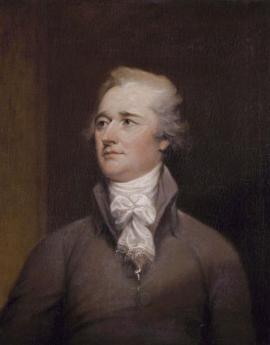
|
| Alexander Hamilton |
Although the Constitution could officially have been declared ratified when nine states had agreed to it, New York and Virginia were such important hold-outs that the new nation would almost certainly fail without them. Alexander Hamilton and John Jay, both of the authors of the Federalist Papers , threatened to have NewYork City succeed if the whole state would not ratify it. Such was their power and prestige, that New York ratification soon followed.
Reference: 8500/14
Concessions and Agreements
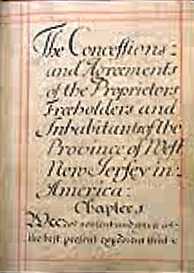
|
| Concessions and Agreements |
The United States Constitution is a unique achievement, but it had significant precursors, many of which James Madison had studied at Princeton. In the days of difficult ocean travel, almost all colonies were bound by an agreement to maintain loyalty to their European owners in spite of receiving latitude to govern themselves. Charters and documents defining these roles were generally written by the owners, and the colonists could pretty much take them or leave them. In the case of New Jersey in 1664, however, a very formidable lawyer and friend of the King named William Penn was drawing up agreements to his own conditions of sale, taking care that the grant of governing authority he received was favorable. Penn's relationship to the King was unusually good, to say the least. He had more reason to be wary of nit-pickers in the King's administration, trying to anticipate every conceivable disappointment for some successor King.
For his part, Penn wanted to make colonial land attractive to re-sell to religious groups who had experienced harsh government oppression; he wanted no obstacles to his announcing there would be no religious oppression in New Jersey. He was offered the role of sub-king although he hastily rejected any such title, and needed to repeat the formalities of the Charter to define his role and reassure his settlers about that matter. Furthermore, he was dealing with the heirs of Carteret and Berkeley, active participants in North and South Carolina. So Penn's method of achieving basic rights was influenced by prior thinking in the Carolinas, as the thinking of John Locke secondarily influenced matters in Delaware and Pennsylvania. These ideas were incorporated in a New Jersey document called "Concessions and Agreements." The concepts were not wholly the ideas of William Penn, but he did write it, and it does contain many ideas that were uniquely his. Understandings about limits were set down, argued about, and agreed to. The owner risked money, the colonist risked his life. Neither would agree unless a reasonable bargain was struck in advance of any dispute. Furthermore, the main value of a colony was beginning to shift from trading rights to real estate rights. Carteret and Berkeley had not only been principals in both the Carolinas and the Jerseys but had been involved in a number of such investments in Africa and the West Indies; New Jersey was just another business deal. It was conventional for documents of this type to define the method of selection of a governor, the establishment of an assembly of colonists, and some sort of council to attend to day to day affairs. In that era, few colonists would cross the ocean without a guarantee of religious freedom, at least for their own brand of religion. Standard clauses which may sound strange in today's real estate world, were then necessary because it was a transfer of not merely land, but also the terms of government. In the case of the Quaker colonies, many of these stipulations were included in the earlier charter from the King. It seems very likely that Penn hovered around and negotiated these points which he wished to have the King agree to; and then once the land was safely his, Penn repeated and expanded these stipulations with the colonists in his Concessions and Agreements . It wasn't exactly a Constitution, but it reads a lot like the one America adopted a century later.
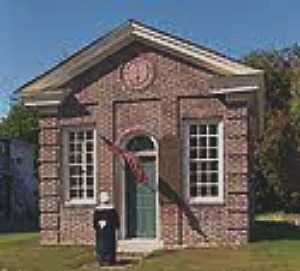
|
| Proprietors House |
Quakers had suffered persecution and imprisonment, and knew exactly what they feared; on the other side, it seems likely Carteret and Berkeley were less interested. So this real estate transfer document conceded almost anything the colonists wanted and the King would stand for, couched in conciliatory phrases. For example, no settler was to be molested for his conscience, and liberty was to be for all time, and for all men and Christians. Elections, by the way, must be annual, and by secret ballot. While law and order must prevail, nevertheless no man is to be imprisoned or molested except by the agreement of twelve men of the neighborhood. On the matter of slavery, no man was to be brought to the colony in bondage, save by his own consent (that is, indentured servants were to be permitted). And in what proved to be a final irony for William Penn, there was to be no imprisonment for debt. Almost all of these innovative ideas survived into the U.S. Constitution a century later, but the most innovative idea of all was to set them all down in a freely-made agreement in writing. This was not merely how a government was organized, it defined the set of conditions under which both sides agreed it would operate.
It was, of course, more than that. It was a set of reassurances to settlers who had been in New Jersey before the English arrived that they, also, would be treated as equals. It was a real estate advertisement to the fearful religious dissenters back in England that it was safe to live here. And it was a reminder to future Kings and Parliaments that this is what they had promised.
The pity and a warning, is that the larger vision of a whole continent governed fairly by common consent may have been too grandiose for a little band of New Jersey Quakers, surrounded as they were by an uncomprehending world. All utopias are helpless when stronger neighbors reject the basic premise. However, it was the expansion of the pacifist concept to the much larger neighboring territory of Pennsylvania that proved to be just too much for such a small group of friends to manage by consensus, particularly when unbelieving immigrants began to outnumber them. But the essential parts of it certainly remained in the minds of delegates to the Constitutional Convention in 1787. When the minutes of the Constitutional Convention speak of the "New Jersey Plan", the Concessions and Agreements was what they had in mind.
REFERENCES
| Concessions and Agreements of New Jersey 1676: William Penn | New Jersey State Library |
| Camden After the Fall: Decline and Renewal in a Post-Industrial City: Howard Gillette Jr.: ISBN-13: 978-0812219685 | Amazon |
Declaration of Rights of the Continental Congress, October 14, 1774
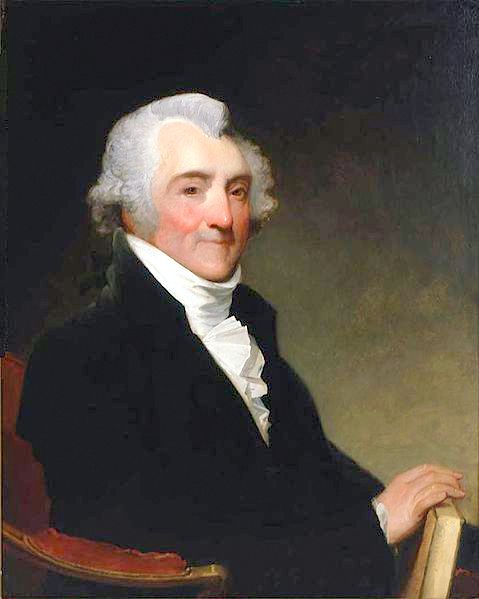
|
| John Sulllivan |
Whereas, since the close of the last war, the British Parliament, claiming a power of right to bind the people of America, by statute, all cases whatsoever, hath in some acts expressly imposed taxes on them and in others, under various pretenses, but in fact for the purpose raising a revenue, hath imposed rates and duties payable in these colonies established a board of commissioners, with unconstitutional powers, and extended the jurisdiction of courts of admiralty, not only for collecting the said duties but for the trial of causes merely arising within the body of a county.
And whereas, in consequence of other statutes, judges, who before held only estates at will in their offices, have been made dependent on the Crown alone for their salaries, and standing armies kept in time of peace:
And whereas it has lately been resolved in Parliament, that by force of a statute, made in the thirty-fifth year of the reign of Henry the Eighth, colonists may be transported to England, and tried there upon accusations for treasons, and misprisions, or concealments of treasons committed in the colonies, and by a late statute, such trials have been directed in cases therein mentioned.
And whereas, in the last session of Parliament, three statutes were made; one, entitled "An act to discontinue, in such manner and for such time as are therein mentioned, the landing and discharging, lading, or shipping of goods, wares, and merchandise, at the town, and within the harbor of Boston, in the province of Massachusetts Bay, in North America"; and another, entitled "An act for the better regulating the government of the province of the Massachusetts Bay in New England"; and another, entitled "An act for the impartial administration of justice, in the cases of persons questioned for any act done by them in the execution of the law, or for the suppression of riots and tumults in the province of the Massachusetts Bay, in New England." And another statute was then made, "for making more effectual provision for the government of the province of Quebec, etc." All which statutes are impolitic, unjust and cruel, as well as unconstitutional, and most dangerous and destructive of American rights.
And whereas, assemblies have been frequently dissolved, contrary to the rights of the people, when they attempted to deliberate on grievances; and their dutiful, humble, loyal, and reasonable petitions to the Crown for redress, have been repeatedly treated with contempt by His Majesty's ministers of state:
The good people of the several colonies of New Hampshire, Massachusetts Bay, Rhode Island and Providence Plantations, Connecticut, New York, New Jersey, Pennsylvania, New Castle, Kent and Sussex on Delaware, Maryland, Virginia, North Carolina, and South Carolina, justly alarmed at these arbitrary proceedings of Parliament and administration, have severally elected, constituted, and appointed deputies to meet and sit in general congress, in the city of Philadelphia, in order to obtain such establishment, as that their religion, laws, and liberties may not be subverted.
Whereupon the deputies so appointed being now assembled, in a full and free representation of these colonies, taking into their most serious consideration, the best means of attaining the ends aforesaid, do, in the first place, as Englishmen, their ancestors in like cases have usually done, for asserting and vindicating their rights and liberties, declare, That the inhabitants of the English colonies in North America, by the immutable laws of nature, the principles of the English Constitution, and the several charters or compacts, have the following rights:
Resolved, N. C. D. [Nemine contradicente, no person disagreeing]1. That they are entitled to life, liberty, and property, and they have never ceded to any sovereign power whatever, a right to dispose of either without their consent
Resolved, N. C. D. 2. That our ancestors, who first settled these colonies, were at the time of their emigration from the mother country, entitled to all the rights, liberties, and immunities of free and natural-born subjects, within the realm of England.
Resolved, N. C. D. 3. That by such emigration they by no means forfeited, surrendered, or lost any of those rights, but that they were, and their descendants now are, entitled to the exercise and enjoyment of all such of them, as their local and other circumstances enable them, to exercise and enjoy.
Resolved, 4. That the foundation of English liberty, and of all free government, is a right in the people to participate in their legislative council: and as the English colonists are not represented, and from their local and other circumstances, can not properly be represented in the British Parliament, they are entitled to a free and exclusive power of legislation in their several provincial legislatures, where their right of representation can alone be preserved, in all cases of taxation and internal polity, subject only to the negative of their sovereign, in such manner as has been heretofore used and accustomed. But, from the necessity of the case, and a regard to the mutual interest of both countries, we cheerfully consent to the operation of such acts of the British Parliament, as are bona fide, restrained to the regulation of our external commerce, for the purpose of securing the commercial advantages of the whole empire to the mother country, and the commercial benefits of its respective members; excluding every idea of taxation, internal or external, for raising a revenue on the subjects in America, without their consent.
Resolved, N. C. D. 5. That the respective colonies are entitled to the common law of England, and more especially to the great and inestimable privilege of being tried by their peers of the vicinage, according to the course of that law.
Resolved, N. C. D. 6. That they are entitled to the benefit of such of the English statutes as existed at the time of their colonization; and which they have, by experience, respectively found to be applicable to their several local and other circumstances.
Resolved, N. C. D. 7. That these, His Majesty's colonies, are likewise entitled to all the immunities and privileges granted and confirmed to them by royal charters, or secured by their several codes of provincial laws.
Resolved, N. C. D. 8. That they have a right peaceably to assemble, consider of their grievances, and petition the King; and that all prosecutions, prohibitory proclamations, and commitment for the same, are illegal.
Resolved, N. C. D. 9. That the keeping a standing army in these colonies, in times of peace, without the consent of the legislature of that colony, in which such army is kept, is against law.
Resolved, N. C. D. 10. It is indispensably necessary to good government, and rendered essential by the English constitution, that the constituent branches of the legislature be independent of each other; that, therefore, the exercise of legislative power in several colonies, by a council appointed, during pleasure by the Crown, is unconstitutional, dangerous, and destructive to the freedom of American legislation.
All and each of which the aforesaid deputies, in behalf of themselves and their constituents, do claim, demand, and insist on, as their indubitable rights and liberties; which cannot be legally taken from them, altered or abridged by any power whatever, without their own consent, by their representatives in their several provincial legislatures.
[Author: John Sulllivan, Delegate and later Governor, New Hampshire]
REFERENCES
| A Familiar Exposition of the Constitution of the United States: Containing a Brief Commentary on Every Clause, Explaining the True Nature, Reasons, and ... Designed for the Use of School Libraries and General Readers; Joseph Story: ISBN-13: 978-1886363717 | Amazon |
Sources of Revolutionary Populism
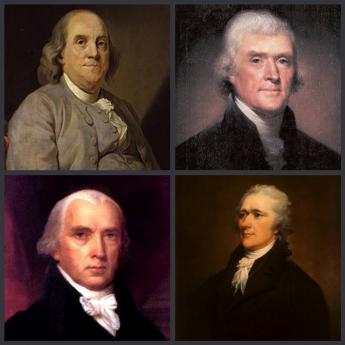
|
| Founding Fathers |
Those who now look back at the Founding Fathers often fail to account for the aging process during the eleven years between the Declaration of Independence in 1776 to the Constitutional Convention of 1787. The two events took place in the same building, Independence Hall, and many participants of the Convention were fellow Revolutionary War veterans. But there was originally a great social difference between a colonial leader and a teen-aged soldier at the beginning of this period, which tended to seem blurred by the experiences of the war. Someone who fought and was wounded as a common soldier might later grow into the dignity of a former war hero, but underneath this veneer was a very different experience from an early leader of the colonial rebellion, or after the onset of serious hostilities, an older man who seemed eligible to be a Revolutionary officer. The original generation of rebels conspired to restore proper British rights for individual colonies, while the teenager who fought in the Continental Army under his idol George Washington saw himself as fighting for the freedoms of individuals, living in a new nation.
What emerged were two generations of Founding Fathers, one of which was generally an officer fighting for the right of his state to be fairly represented, the other a young common soldier, fighting for the individual right of free speech. One wanted to protect his colonial region's religion, the other wanted the freedom to choose his own religion. Both of them felt entitled to say how things were to be run, but young men eventually become older men. No better example of aging's transformation of attitudes could be found than the life of John Marshall. This teenaged wounded veteran of the Battle of Trenton evolved into Chief Justice of the Supreme Court, the author of a multi-volume biography of George Washington, and almost the last man standing who could be called a Federalist. Other teenaged soldiers took different paths in life.
History belongs to the victor, so it is also important to recollect that almost a third of the colonists had been Tories. In general, the upper crust of society tended to be more loyalist. Thousands of Loyalists fled to Canada, and thousands more fought on the British side. When General Clinton abandoned the occupation of Philadelphia, three thousand Loyalists accompanied him. The loss of these more educated and wealthier citizens and the lowered public profiles of those who remained in America skimmed off a considerable portion of the natural leadership of the colonies. Those young men who were left behind were victors, often exhilarated to discover that if they did not lead, no one would lead.
The embodiment of these population shifts was to be found in state governments with unicameral legislatures, popular election of judges, and weak executives -- all of which have since been repudiated by experience, but all of which reflect a distrust of leaders. Partly this might be attributed to lack of experience, greater reliance on collective government by the herd instinct, the recklessness of youth, and fear that power will eventually return to the hands of those who are educated to handle it. The hostility of the lower classes to those who are better off has many causes, but in this situation, it was promoted by unexpected elevation to leadership, combined with a subsequent determination not to lose power again -- balanced against the rather strong possibility that they would. Add to this the continued influx of immigrants fleeing from foreign oppression, and it is not surprising that the result is an enduring strain of populism stirring up a latent tendency to class warfare. You, too, can be President; but you must fight if you expect to succeed. The former aristocratic attitude was that you are born to rule, as long as you don't do something stupid.
REFERENCES
| The Great Courses: History of the United States, 2nd Edition Course #8500: Lecture 14 Creating the Constitution: Aurthor: Allen C. Guelzo: ISBN: 156585763-1 | The Great Courses |
Appealing the Constitution to a Higher Authority
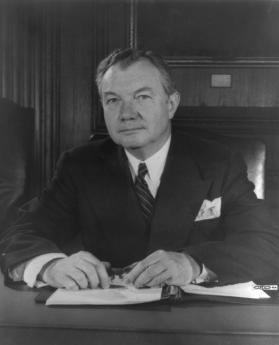
|
| Justice Robert H. Jackson |
According to Justice Robert H. Jackson, "We" (The Supreme Court) "are not final because we are infallible, we are infallible because we are final." Scoop Jackson was the last Justice who never went to college or graduated from Law School, so his viewpoint concentrated on the practical outcome of a situation. In fact, the father of our constitution, James Madison, was learned in the history of many constitutions, and was well aware of allusions to divinity in the construction of our governing document, particularly when the sources of strong beliefs couldn't be grounded in evidence. However,the Age of Enlightenment was highly religious, so they gave credit to divine guidance when they really were imitating the Legal profession.The lawyer's system of progressive appeal to a hgher court of appeals was a very clever adaptation of recognition that most problems are pretty simple andcan be handled without much training.The Constitution is an attempt to reconcile our culture to the needs of government and the revelations of controversy. Composed by Enlightenment rationalists within a highly religious environment, the Founding Fathers were careful to use the metaphors of Religion, even though many were personally skeptics about the substance. Indeed, the Penman of the Constitution who ultimately wrote most of the words was Gouverneur Morris, a flagrant libertine. It had been the tradition of Constitutions to describe their culture by allusion to epic poems, drawing inferences about Right and Wrong from what had subsequently happened to ancient heroes after similar situations unfolded. Some would put the plays of Shakspere in that role in 1787, but the evidence is stronger for Roman writers, like Cato and Cicero. In my own view, this leap of faith was only divine in the sense it was a one-way street. A citizen might try to emulate the ancients, but appealing back to them was not likely to work.
Although the Constitution can be viewed as bridging a gap between Culture and Common Law, or perhaps as placing a guardhouse between them, this relationship is not spelled out and therefore, in theory, might be changed. Other cultures, perhaps the native Indian, or the Catholic Church of Central Europe, might be substituted, or other legal structures resembling the Napoleonic Code might serve on the opposite side of the bridge. These substitutions were a legal possibility, but there is little doubt the American leadership intended for an Anglo-Saxon culture, linked with Francis Bacon's legal system, to prevail under a distinctively American flag. Because of our debt to France for then-recent assistance, there was once the possibility of French coloration to our culture, but the excesses of the French Revolution soon ruled that out. Some modern observers have capsulized the scene: First, we got the British to help throw out the French in 1754; and then in 1776, we got the French to help us throw the British out. Both our allies thought we played their game, but we were playing our own. The new Constitution specified no laws, but with little doubt the Framers intended the states to adopt British Common Law without the infelicity of saying so.
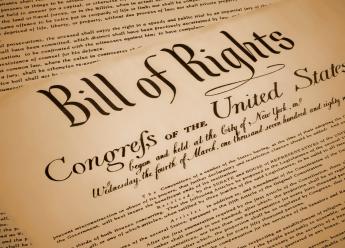
|
| Bill of Rights |
And then there is the Bill of Rights. Madison had great faith in the ability of structure (separation of powers, term limits, etc.) to command predictable outcomes, and initially resisted any need for a Bill of Rights. But the Ratification Conventions in the states showed him the need to yield. The First Congress soon enough confronted over a hundred proposed rights in petitions from the states, especially the four big ones. If anyone else had been in Madison's position, our Bill of Rights would resemble the European one today, fifty pages long and growing. That outcome would have greatly weakened the Legislative branch since after protests about Mother Nature subside, the legal fact emerges that Rights are merely laws which no majority can overturn. They might even be characterized as a contrivance for transient majorities to promote the permanence of their viewpoint.

|
| The Founding Fathers |
But they are not the only contrivance in politics. Enshrinement of the Founding Fathers elevated their political positions into near divinity, whereas debunking the Founders personally undermines their symbolism as statues and myths. There was too much of this during the romance period of the Nineteenth century, but also in von Ranke's later marginalization of History into mere scholarship and footnotes, which was a reaction to it. The Founding Fathers themselves now supplant Achilles and Cincinnatus in our lexicon, and we have little choice but to accord more weight to their original intent in the Constitution, than to contemporary reasonings. Indeed, we are forced to acknowledge more similarity between George Washington's fictitious cherry tree than to his relations with Peggy Fairfax, when we interpret his thundering "Honesty is the best policy" in the second inaugural address. It is admittedly a difficult choice, but Justices now need to consider what his audience widely believed was his original intent, more than what later archeological discoveries uncover. Justice Scalia is correct in placing more weight on the original intent of the Founding Fathers than contemporary reactions to the same words. But in occasional conflicts between myth and reality, it seems safer to consider what the audience then widely believed, than what modern audiences would guess at.
Repairing Constitutional Defects
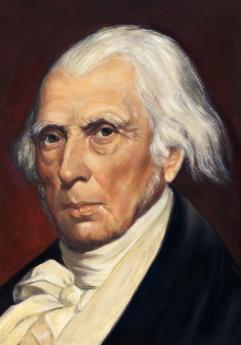
|
| James Madison |
Out of several thousand proposed ones, there have only been 27 successful amendments to the Constitution in two centuries; it's been intentionally hard to get an amendment passed. The Federalists wanted no amendment process at all; the anti Federalists wanted repeat conventions in which the whole document would be thrown on the table for reconsideration. The original document probably turned out better because of this tension; if it's hard to change, you better do it right the first time. And amendments had better be short and clear.
There will, of course, have to be some mid-course adjustments, most notoriously the XII Amendment, correcting drafting amateurishness which promptly led to all sorts of confusion in the election of the President and Vice-President. It was almost a Gilbert and Sullivan comedy, with the appearance of a tie vote in the 1800 Electoral College between Jefferson and Burr. Since the election campaign had been conducted with the clear intention that Burr would be the vice president on a combined ticket, what was really overlooked was the possibility that ambition would so overwhelm a candidate that he would niggle and cavil about a technicality, essentially trying to steal an election from a running-mate. When Burr later killed Jefferson's enemy Hamilton in a duel, not only was Burr twice disgraced, but the whole episode terminated expectation that gentlemen in a high office could always be depended on to do the right thing. Although philosophical debate can continue whether mankind is inherently good or inherently evil, American law now proclaims a presumed innocence of the accused, while privately assuming universal frailty of everybody.
Sometimes the amendment process has been brushed aside. William Henry Harrison was the first president to die in office, making John Tyler the first vice-president to face certain ambiguities of the Constitution over exactly what had been intended. By that time, the tradition had grown that the vice-presidential candidate was usually a member of the second strongest faction within the winning party. Combining the two makes a stronger ticket but a secretly jealous one. When the contingency of presidential death in office actually happened, there were voices that the vice-president was intended to remain, vice-president, while assuming the extra powers and duties of the president. Rather than have a debate or a Supreme Court wrangle, Tyler settled any such question by simply making himself president, thus establishing an enduring tradition. This solution raised the nit-picker difficulty that still no official succession plan has been provided for a vacant vice-presidential post. Instead of fixing this flaw, it has been ignored. The courts rely on the precedent they have set, which can be defended as constitutionally enshrining common sense, or attacked as refusing to admit making an error.
Somewhat similar corrective themes continue through Amendments XXII (two term Presidential limit), XXV (Presidential succession), XXVII (Congressional compensation). At least when dealing with politicians, it is better to be too specific than too trusting.
The Fourteenth Amendment is clear enough in its many sentences, and noble in intent. But that intention to reverse the original Constitutional tolerance of slavery and the later injustices of Reconstruction is couched in broader language than necessary for that purpose alone. It thus weakens itself by hinting sanctimony, the inclusion of soaring principles. As the grievous wounds of the Civil War have gradually healed, Abolitionists as well as slavers now seem often to have acted with excess, and malice toward some. Others may honorably disagree with this view. Nevertheless, it is quite right to emphasize that just as undue deference should not be accorded to some, undue suspicion should not be inflicted on others.
By a series of amendments, the right to vote has been extended gradually over the centuries. Amendment XXIV (Abolition of poll taxes) probably had other motivations but has the effect of removing a restraint on the vote of poor people, Amendment XIX (Women's suffrage), XXIII (Presidential electors for the District of Columbia), and XXVI (Reducing the voting age to 18) can be characterized as removing discrimination, but also can be seen as a gradual extension of suffrage by those who already have it, to others they have mistrusted for reasons defensible and indefensible. The common goal is to achieve sufficient trust and education to make any restrictions seem unnecessary to everyone while recognizing that continuing immigration of other cultures creates restlessness at the margins. Furthermore, poor people will outnumber rich ones for a long time to come and hence could potentially mistreat the minority. As long as only a minority of the enfranchised population at any level troubles to exercise its right to vote, the level of discomfort with this issue is enough to stimulate progress toward universal suffrage, while satisfaction with gradualism allows time to adjust to it.
Even Universal Franchise can be viewed with suspicion in a polarized political climate. Currently, a vigorous campaign for mandatory voter identification has been met with an equally vigorous denunciation as an attempt to deny the franchise to the poor. Typically, such proposals require the presentation of some government document with an identification photograph, such as a driver's license, to be presented at the voting place. The uproar this proposal has created has itself created suspicion of motive. Those who have experience with ballot-stuffing in elections refer to their common suspicions as "doing it the old-fashioned way." Citizens who make a few dollars as the poll-watchers report that the traditional procedure is as follows:
At least a third of registered voters do not vote, even in a contested Presidential election, and in big-city off-year primary elections, sometimes a heavy majority do not. In the old-fashioned way, the poll watchers wait for dinner time in a sparsely-attended precinct, with no newspapers or poll-watchers of the opposite party present. The registration lists are produced, and everyone who has not voted is voted for the desired candidate. The ruse is enhanced by driving in busloads of party loyalists, claiming to be the absent registered voter; and after casting their ballots, they are bussed off to another polling place to repeat the performance as often as there is time. Matching identification with the voter registration upsets this "good old way", in a manner which has nothing to do with the inability to afford a driver's license, or similar lame excuses.
Amendment XVI (Income tax) may cause dissatisfaction because America has traditionally . But it really is just a mid-course adjustment in the legal system, since a court had declared income taxation to be unconstitutional, and the Constitution was simply amended to remedy that misapprehension. An implicit point, however, is that as the federal government preempts the sources of taxation for itself, the states are weakened by the need to appeal for revenue. The XVII Amendment (Direct election of Senators) rather severely curtailed the control of the states over the central government, but the XI Amendment strengthened the states by forcing the citizen of a different state to sue a state in its own court. The issue of state and federal control, so central to the original Constitution, nowadays seems to be fading in the public mind.
And finally, we are left to consider the first ten amendments, the so-called Bill of Rights. While Madison always inclined somewhat in that direction, and grew more defiantly libertarian as he got older, the situation he faced when the first Congress convened was daunting. Between final ratification and actual convening of much the same people into the first congress, the states submitted over two hundred petitions for rights to be included in the Constitution by amendment. Thomas Jefferson and Patrick Henry had been tireless in stirring up the demand for rights to protect the individual from the government. Much of this reflected the French Revolution which went on for ten years during this period and drew on affection for France for its assistance to the struggling colonies during their rebellion against Great Britain. Others, of course, only needed to look toward George Washington, who had once heard the screams of Braddock's soldiers as they were tortured to death by the French and their Indian allies at Fort Duquesne. Washington had earlier and personally started the French and Indian War. John Adams was not pleased by torch-lit mobs breaking windows in Philadelphia in sympathy with France. So, as the main leader in the new Congress, Madison had the task of satisfying everybody about the Bill of Rights he had promised. It must be acknowledged that he did a masterful job. Not everybody was convinced it was a natural right of mankind to give everyone everything it might seem desirable to have. Somewhere in this arose the accepted definition of a right as something everyone would give to others, in order to have for himself. Madison was forced to search for common denominators, the maximum -- and minimum -- a number of rights which everyone would agree to. It offended his constitutional craftsmanship to see Congress drowned in a rush to confer greater force than law by saying the same thing in an amendment. Indeed, when some advocates strove to make a dubious right into a constitutional right, almost by definition it was not something everyone would agree to in order to have for himself. Madison did things in his life that may be questioned, but his achievement of condensing this hotch-potch of proposals into ten simple declarations, and then getting a raucous inexperienced congress to pass it -- is a political achievement to be marveled at. Even two centuries later, anyone who proposed opening up the Bill of Rights and recasting it in conformity with more modern understanding, would be hooted out of the room. May that ever remains the case.
Amendments IX (Non-enumerated rights) and X (Rights reserved to the states) deserve a different emphasis. Here lay the promise that the federal government had been proposed to achieve only those things a central government could achieve better; the states could do everything else. For this to be workable, the enumerated rights had to be comprehensive enough to satisfy the Federalists, and not include anything the anti-Federalists thought was improper. The anti Federalists knew very well this included everything the Federalists could possibly get the states to agree to, so the border was inevitably contentious. They got it wrong with slavery, and some of the amendments made mid-course adjustments. Boundary warfare would continue indefinitely in Congress, and sometimes wars and depressions cause proponents to change positions. But the document, freely agreed to by formerly sovereign states, has endured as nothing even remotely comparable has endured.
James Madison
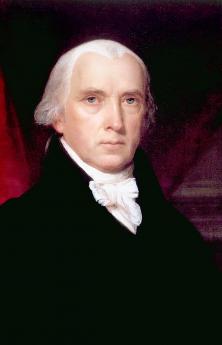
|
| James Madison |
JAMES Madison was born (1751) a rich Virginia planter, was a major factor in the composition of the U.S. Constitution, became secretary of State and President of the United States for two terms (1812-20), and died (1836) impoverished at the age of 85. Because the Constitutional Convention was conducted in secrecy, we cannot be entirely certain which parts to attribute to him, or even what his personal position had been on many issues. He was Chairman of the Committee of the First Congress and the dominant figure writing the Bill of Rights, which he had declared were unnecessary. These early Amendments to the Constitution were therefore sparsely confined to those rights which met universal approval and excluded the many proposals of rights which were controversial. The surprising outcome is that the Bill of Rights survives as a bedrock summary of the nation's belief system. There is a tendency to review the actions of all Presidents after they leave office, searching for remarks or behavior which clarifies their official actions while President, and in Madison's case his positions on the dominant Constitutional issues of our Republic. However, that later period of his life was marked by many abrupt reversals of inexplicably contradictory positions that often lessen his stature, and embarrass his earlier achievements. Gouverneur Morris, for example, had the lowest possible opinion of Madison, summarizing him as merely a drunkard. Morris was so contemptuous of Madison that during the War of 1812 that aristocratic main editor of the Constitutional document denounced the whole effort in disgust, mainly devoting his own efforts to making money from the Erie Canal, and later going to France in the Bonaparte era. Other close observers refrained from comment about Madison's drinking habits, and we must presently remain uncertain whether the comment explains Madison's erratic behavior, or whether it was merely an emotional exaggeration by Morris who spent most of his own later life, acting entertainingly at social gatherings.
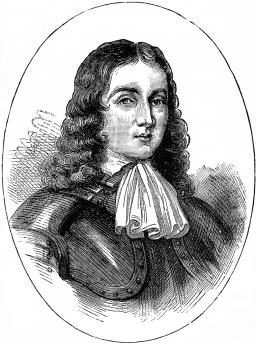
|
| William Penn |
On the one hand, and on the other; there is scarcely an episode in Madison's life which could not begin with the same words. Madison had tuberculosis and was sent North to go to college at Princeton, where he was much taken with Quaker beliefs in a state still controlled by William Penn's proprietors, but in a College whose campus thoughts were dominated by refugees from the Scottish Enlightenment. He was a good student and stayed an extra year to study Greek under the famous John Witherspoon. He was soon involved in politics, catching the eye of General Washington with his active promotion of the cause of the unpaid Revolutionary Army. Washington soon enlisted the efforts of this neighboring Virginia planter in organizing a new Constitutional Convention, primarily intended to strengthen central government against the intransigent state legislatures, with a particular effort to enable the central government to levy taxes to service war debts. Neither Washington nor Madison knew much about finance; the ideas about leveraging sovereign debt through a central bank evidently came from Robert Morris, who was a close friend of Washington's and in many ways the acting President of the United States during the Revolution. The young Alexander Hamilton bore the same sort of relationship to Morris as the young Madison bore to the General who was a generation older; in both cases, they supplied their own ideas, but mainly applied time, youth and energy to the concepts of their seniors. Hamilton and Madison became fast friends in a great cause, notably collaborating in the writing of the Federalist Papers to promote the new Constitution. Madison was the great scholar of the Roman Republic, a Washington favorite, and displayed a remarkable innate talent for politics in the finest sense, explaining complicated logic and persuading the unpersuaded. Washington nursed a passionate hatred for partisan politics and collaborated with the daily assistance of Madison in defining the traditions of the American presidency. Washington wanted to avoid the appearance of being a King, which was another Washington hatred but was badly in need of some models for an entirely new concept, the executive branch of a deliberately divided government. In one famous episode, Madison wrote Washington's speech, then wrote the reply to Washington by Congress, then wrote Washington's thank-you note back to Congress. Madison was devoted to his work; he only married Dolley Madison when he was 37 years old. Madison would seem to qualify for the category now called nerd.
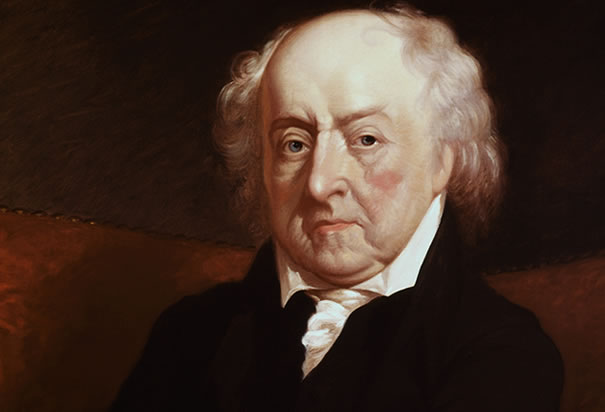
|
| John Adams |
Hamilton, on the other hand, had many children, legitimate and otherwise, many girlfriends, at least two duels, and flamboyant behavior on the parapets of Yorktown during the final battle. Unlike the aristocratic Madison, he was described by John Adams as the "bastard brat of a Scottish peddler". Although both men seemed to be driven by their short stature, Hamilton never let it get the better of him. Even Martha Washington was amused by his rambunctious behavior, naming her tomcat after him. Both men seemed unduly influenced by their new friends, Hamilton by his rich New York wife's rich friends, and Madison by Thomas Jefferson and Patrick Henry, the big men on campus so to speak, of the Virginia scene. When Hamilton began to favor banks, bankers and obscure financial wizardry -- and particularly after Madison's hero George Washington took Hamilton's side in the establishment of a central bank-- Madison was ready to be courted by his childhood heroes in Tidewater Virginia, particularly Thomas Jefferson, who always wrote prose as if writing poetry. That's about all we really know about the episode, and there is probably more we don't know, but Madison in an instant became Hamilton's mortal enemy, Jefferson's fast friend, an enemy of the bank, and -- the founder of America's first political party. George Washington never spoke to him, again. It seems possible to suspect that Jefferson was jealous of Washington, although he always was very careful not to confront him directly. When Hamilton persuaded Congress to enact a whiskey tax, Albert Gallatin and other friends of Jefferson's party stirred up the Whiskey Rebellion in Western Pennsylvania, and Washington personally led fifteen hundred Federal troops across the mountains to put down the rebellion. General Alexander Hamilton was at his side. James Madison was somewhere else, probably reading a book. Madison was the sort of person who always knew when his enemies had the votes. He was often lost without the assistance of Gallatin, who somehow knew when the enemy had the better argument.
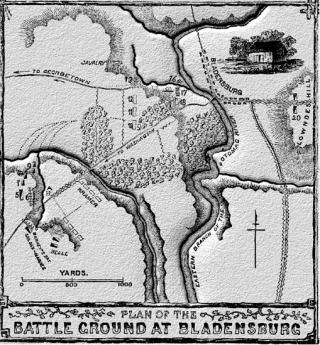
|
| Bladensburg races |
Eventually, America split between those who sympathized with the French and their land domination of Europe and those who began to seek a repair of the trade relationship with Brittania which ruled the waves. The Adams presidency was ruined by fallout from this international warfare, an embargo was imposed, and both France and England did their bit to make things worse. At one point, it was uncertain whether America would be going to war with France or with England. Eventually, it was with England in the War of 1812. Jefferson and Madison had become successive presidents dedicated to saving money by disarmament, but in spite of our having no navy and nothing but militia for an army, we blithely set about to conquer Canada, with the plan of trading it for trade concessions from the British Empire. Unfortunately, the War was a several-year series of overwhelming defeats for the Madison administration, culminating in the burning of Washington D.C. and the "Bladensburg races" (for the exits), but celebrated as Dolley Madison rescuing the portrait of George Washington, and Francis Scott Key writing the "Star Spangled Banner" about the bombardment of Baltimore. Indian massacres in Michigan and other western defeats complimented the litany of disaster, which was finally ended when Gallatin negotiated the Treaty of Ghent as status quo pro antebellum with the preoccupied British, and then celebrated Andrew Jackson's defeat of the British army at New Orleans, after the Treaty had been signed but before news of it reached home. As Madison's last acts at the end of his term, he promoted Adam Smith economics, the reconstitution of the Bank, a general rearmament campaign -- and then vetoed the bill when it passed. To say that Henry Clay in Congress was embarrassed is to stretch the limits of language. After he left office, Madison became a senior statesman, making all sorts of pronouncements about current events and the true meaning of some Constitutional point involved, quite regularly reversing his positions and encouraging secession by talking about it so much.
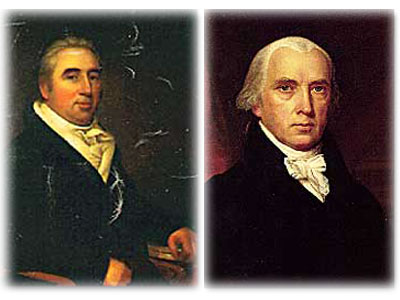
|
| Marbury v. Madison |
This sorry tale is too long to present fairly and accurately, while its point can be most simply made by reference to Madison's first involvement as Secretary of State, in the famous Supreme Court case of Marbury v. Madison . When the departing Adams administration made some last-minute inconsequential appointments, one of them was to Marbury. At the beginning of the Jefferson Presidency, John Marshall was the departing Secretary of State, James Madison the incoming one. The appointment to Marbury was duly made and ratified, its certificate lying on the desk of the Secretary of State. Marshall (outgoing) neglected to send the certificate to Marbury, and Madison (incoming) refused to do so, on the advice of Jefferson the President; none of them ends up looking, adult. Instead of recusing himself, Marshall as Chief Justice further entangled himself in a dispute where he was the referee, by devising the concept that the Supreme Court could declare acts of Congress unconstitutional, and trapping Jefferson into a position where he had to agree with it. All in all, it certainly would seem simpler for Madison to have sent over the certificate. The authors of the three most famous documents in the American icon were inaugurating what a recent biographer Kevin R.C. Gutzman, described as the Presidencies of Chicanery.
James Madison deserves the highest praise for his achievements in three documents: the Virginia Plan, which was the forerunner of the Articles portion of the Constitution, that is to say, the basic structural components of our present government. Secondly, the bulk of the Federalist Papers leading to the Ratification of the Constitution. And third, the Bill of Rights, which he saw no need for, and therefore personally rewrote to be miraculously sparing of language, limited to bedrock essentials, and celestial as a statement of American national purpose.
Madison lived a long life, but it is difficult to find anything in the last forty years which justifies his early promise. Or which could be called a disgrace to it, either, if he had only made a more ordinary beginning.
REFERENCES
| James Madison and the Making of America: Kevin R. C. Gutzman: ISBN-13: 978-0312625009 | Amazon |
First Amendment: Separation of Church and State
 Amendment 1 Congress shall make no law respecting an establishment of religion, or prohibiting the free exercise thereof; or abridging the freedom of speech, or of the press, or the right of the people peaceably to assemble and to petition the government for a redress of grievances. 
|
| The First Amendment |
Simplified histories of America often declare that other Western Hemisphere colonists mostly came to plunder and exploit; whereas English Protestant colonists came with families to settle, fleeing religious persecution. That's a considerable condensation of events covering three centuries, but it is true that before the Revolutionary War, eleven of the thirteen American colonies approximated the condition of having established religions. Massachusetts and Virginia, the earliest colonies, had by 1776 even reached the point of rebelliousness against their religious establishments. The three Quaker colonies (New Jersey, Pennsylvania, and Delaware) were late settlements, in existence less than a century before the Revolution, and still comfortable with the notion they were religious utopias. While differing in intensity all colonials respected the habits of thought and forms of speech, natural to utopians residing in a religious environment.
Once Martin Luther had let the Protestant genii out of its religious bottle, however, revisionist logic was pursued into its many corners. Ultimately, all Protestant questers found themselves confronting -- not religious dogmatism, but it's opposite -- the secularized eighteenth-century enlightenment. Comparatively few colonists were willing to acknowledge doubts openly about miracles and divinity. However, private doubts were sufficiently prevalent among colonial leaders to engender restlessness about the tyrannies and particularly the rigidities of the dominant religions. To this was added discomfort with self-serving political struggles observable among their preachers, and alarm about occasional wars and persecutions over arguably religious doctrines. Arriving quite late in this evolution of thought -- but not too late to experience a few bloody persecutions themselves -- the Quakers sought to purify their Utopia by eliminating preachers from their worship entirely. Thus, the most central and soon the most prosperous of the colonies made it respectable to criticize religious leaders in general for the many troubles it was believed they provoked.
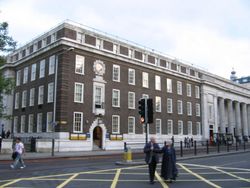
|
| London Yearly Meeting |
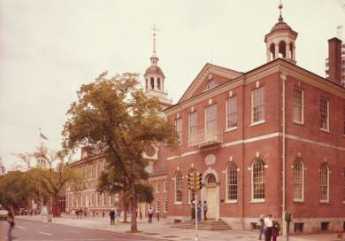
|
| Congress Hall |
In all wars, diplomatic arts and religious restraints get set aside as insufficient, if not altogether failures for an episode of utter barbarism. In the Revolution, some Quakers split from pacifism and became Free Quakers, many more drifted into Episcopalianism, never to return to pacifism. The Constitutional Convention of 1787 was eventually held in this persisting environment; the previous service in the War counted for something, and the great goal was to strengthen the central government -- for more effective regional defense. A great many leaders were Masons, holding that much can be accomplished by secular leadership, independent of religious reasonings. Neither Washington nor Madison revealed much of their religious positions, although Washington the church attender always declined communion; Franklin and probably Jefferson were at heart deists, believing that God might well exist, but had wound up the universe like a clock to let it run by itself. The New England Calvinist doctrines have since evolved as Unitarianism, which outsiders would say theologically is not greatly different from deism. Physically surrounding the Philadelphia convention was a predominantly Quaker attitude; entirely too often, preachers get you into trouble.
When the first Congress finally met under their new constitution, they immediately confronted over a hundred Constitutional amendments, mostly submitted from the frontier and fomented by Jefferson and Patrick Henry, demanding a bill of rights. The demand within these amendments was overwhelming that the newly-strengthened central government must not intrude into the rights of citizens. Recognizing the power of local community action, states rights must similarly be strengthened. Just where these rights came from was often couched in divine terms for lack of better proof that they were innate, or natural. From a modern perspective, these rights in fact often originated in what theologians call Enthusiasm; the belief that if enough people want something passionately enough, it must have a divine source. The newly minted politicians in the first Congress recognized something had to be done about this uproar. Congress formed a committee to consider matters and appointed as chairman -- James Madison. Obviously, the chief architect of the Constitution would not be thrilled to see his product twisted out of shape by a hundred amendments, but on the other hand, a man from Piedmont Virginia would be careful to placate the likes of Patrick Henry. The ultimate result was the Bill of Rights, and Madison packed considerably more than ten rights into the package, in order to preserve the cadence of the Ten Commandments. The First Amendment, for example, is really six rights, skillfully shaped together to sound more or less like one idea with illustrative examples. Overall freedom of thought comfortably might include freedom of speech (and the press), along with freedom of religion and assembly, and the right to petition for grievances. But what it actually says is that Congress shall not establish a national religion. Since eleven states really had approximated a single established religion, the clear intent was to prohibit a single national religion while tolerating unifications within the various states. Subsequent Supreme Courts have extended the Constitution to apply to the states as well, responding to a growing recognition that religious states had the potential to get so heated as to war with each other. No matter what their doctrines, it seemed wise to deprive organized religions of political power as a firm step toward giving the Constitution itself dominant power over the processes of political selection.
At first however it was pretty clear; one state's brand of religion was not to boss around the religion of another state. Eventually within one state, Virginia for example, the upstate Presbyterian ministers were not to push around the Episcopalian bishops of the Tidewater. Madison and Jefferson saw well enough where political uprisings tended to start in those days, in gathered church meetinghouses. In this way, an Amendment originally promoted to protect religions had evolved into a way to ease them out of political power. The idea of separation of church and state has grown increasingly stronger, to the point where most Americans would agree it defines a viable republic. No doubt, the spectacle of preachers exhorting the same nation in opposite directions during the Civil War, settled what was left of the argument.
For Quakers, the most wrenching, disheartening revelation came when they were themselves in unchallenged local control during the French and Indian War. The purest of motives and the most earnest desire to do the right thing provided no guidance for those in charge of the government when the French and Indians were scalping western settlers and burning their cabins. Yes, the Scotch-Irish settlers of the frontier had unwisely sold liquor and gunpowder to the Indians, and yes, the Quakers of the Eastern part of the state had sought to buffer their own safety from frontier violence by selling more westerly land to combative Celtic immigrant tribes. A similar strategy had worked well enough with the earlier German settlers, but reproachful history was not likely to pacify frontier Scots in the midst of a massacre. The Quaker government was expected to do what all governments are expected to do, protect their people right or wrong. To trace the social contract back to William Penn's friend John Locke was too bland for a religion which prided itself on plain speech. Non-violent pacifism just could not be reconciled with the duties of a government to protect its citizens. The even more comfortably remote Quakers of the London Yearly Meeting then indulged themselves in the luxury of consistent logic; a letter was dispatched to the bewildered Quaker Colonials. They must withdraw from participation in a government which levied war taxes. And they obeyed.
Although the frontier Scots were surely relieved to have non-Quakers assume control of their military duty, the western part of the state has still neither forgotten nor forgiven. In their eyes, Quakers were not fit to be in charge of anything. Quaker wealth, sophistication and education were irrelevant; only Presbyterians are fit to rule. A strong inclination toward pre-destination lurks in that idea. Once more, the attractiveness of clear separation of church and state is reinforced.
The French and Indian War in fact had turned out fairly well; most of its victories were located on the European side of the Ocean, anyway. But twenty years later the Revolutionary War turned into a reassertion of the British conquest of all of North America, not merely the part to the west of the Appalachian mountains. To Americans, this came in the form of a demand for taxes to help pay off the costs of a war which greatly benefitted them. The Quaker colonies did not fully sympathize with rebellion, but they had once given up control of a territory larger than England rather than pay war taxes, so they were resistant to both sides in the dispute. Many prosperous and educated Quakers solved their dilemma by fleeing to Canada, but the ardent Quaker proposal for dealing with a coercive British government was not at all impractical. John Dickinson, in particular, argued that since the British motives were economic, success was most likely to come from economic counter-pressure, adroitly leveraged by three thousand miles of intervening ocean. That was shrewd and potentially effective. But the Scots-Presbyterian position was simpler and more direct. If you want us to fight your war, you are going to have to fight to win. The Virginia Cavaliers were probably more likely to win a conventional war if put in charge, but the blunt and almost savage frontiersmen were ideally suited for what has come to be called guerrilla warfare. Washington was a leader, French money was welcome and Ben Franklin was a diplomat, but the clarion call to this particular battle was the voice of Patrick Henry. All in all, the issue of established religion was far more complicated than merely the affirmation of a right to free exercise of religious belief. What united all the colonies was a recognition that, using the church, an arm of the government was just as likely to cause trouble as conducting the state as an instrument of church interests. Eventually, considering how religious America was at the time, there was remarkably little resistance to the firm separation of Church and State in its Constitution.
Boston firearms license
This is the process my son went through in October-November 2012 to get a Boston firearms license.
- Call (617) 343-4425 to make an appointment; usually a month's wait.
- On the application appointment date, you go to 1199 Tremont St, Boston MA (Boston Police Headquarters)
Bring:- Birth Certificate
- MA Driver's license showing Boston address
- MA State Police Gun Safety training certificate
- $100 in cash (no credit cards!)
 AMENDMENT II A well-regulated militia, being necessary to the security of a free state, the right of the people to keep and bear arms, shall not be infringed. 
|
| Constitution of the United States |
The process at Police Headquarters is straightforward: arrive 15 minutes early to fill in paperwork and be out an hour later after answering simple, obvious questions and getting photographed and fingerprinted.
My son was told that the default is a restriction to Target and Sport; a letter showing a business or personal need for an unrestricted license is required after the initial restricted license is received.
His appointment at the Moon Island outdoor range was set for a week later. (It's an island in the harbor off Quincy.)
The qualifying shoot at the Moon Island outdoor range was easy:
- He got a very helpful lecture from a Police Dept. instructor, covering both shooting and safety
- At the outdoor range:
- 12 rounds at 7 yards: two hands, double action (one hand optional)
- 18 rounds at 15 yards: two hands, single action (hammer to be pulled with the supporting-hand thumb)
He got a 296 out of 300 (two 9's, one 8). He did well because of the 3 private lessons he took at the Mass Firearms School range where he shot two boxes each time using their 0.38 revolver (the equipment provided at the Moon Island range was brand new, much easier to use and more accurate so he was very well prepared). All the other scores were lower than his, one person out of six failed.
He was told his license would take 12 weeks to process; he received his Class A Large Capacity License to Carry Firearms, restricted to target and hunting, 51 days (7 1/2 weeks) after his qualifying shoot.
Second Amendment: The 28th Infantry Division
SINCE the nation was only formed in 1776, and the only memorable war before that was the French and Indian War of 1754, the origin in 1747 of the Pennsylvania 28th Division of Infantry needs a little explaining. The 28th is a National Guard reserve unit, taking its present organizational form 138 years ago. Even counting from that moment makes it the oldest (and third largest) division in the Army, but another 123 years of history stretch back before that.
 AMENDMENT II A well-regulated militia, being necessary to the security of a free state, the right of the people to keep and bear arms, shall not be infringed. 
|
| Second Amendment |
A few people remember that Ben Franklin made his first step into politics during King George's War (1744-48), when French and Spanish privateers were suddenly roaming Delaware Bay . The pacifist Quaker government hesitated in confusion, so Franklin stepped forward to call for a volunteer militia. It was paid for with a lottery because the Quaker legislature resisted; there seemingly was no end to Franklin's ingenuity. The unit remained a permanent one, and since then served with distinction in the various conflicts through the Civil War, when it was organized into the National Guard. The volunteer movement it inspired was part of the impetus for the Second Amendment to the Constitution which the National Rifle Association will be glad to explain to you, although historians commonly trace the civilian soldier tradition back to King James and the English Civil War. Franklin was unfailingly patriotic, and never hesitated about military measures when they seemed necessary. He lived long enough so his military sympathies were still a dominant force at the Constitutional Convention, more than forty years later.
Major General Wesley E. Craig Jr., former commander of the Division, was kind enough to address the Right Angle Club about the 28th Division recently. Since the citizen soldiers of the National Guard all have other careers, his daytime job was as an executive for Strawbridge and Clothier. A moment of reflection about the Scottish origin of his own name, connected with a strongly Quaker firm, evokes the two strongest social and ethnic tensions of early Pennsylvania history.
The audience was treated to a description of the military history of the unit, whose largest battle was the Battle of the Bulge in World War II. But they are in Iraq today, with almost every soldier having served one tour of duty, many of them two or even more. They were the unit stationed in El Ambar province during the period before the Sheiks finally decided that America was going to win this war, and changed sides. General Craig had returned to America only a month before this famous turning-point. Before that, units of the 28th were in Bosnia and Kosovo, and are proud to have been chosen for the introduction of many innovative technologies. They are the only reserve division with Stryker vehicles, and before that employed unmanned drone aircraft for reconnaissance. Observer drones fly at 2000 feet and carry no weapons, unlike the Predator drones which carry rockets and fly at 10,000 feet.
Not everything is a story of combat action; the 28th Division is very proud of its activities in the Katrina rescue missions and other domestic emergencies. The Go Ahead Division is proud of its reputation for being on time, every time.
And it is mindful of the sad side. In Iraq, it is 31 KIA, with 167 WIA. If you're uncertain what that means, try a little harder.
Boalsburg

|
| Boalsburg |
FIVE miles East of State College is Boalsburg, which is by far the most interesting place in Central Pennsylvania. First of all, the town itself is laid out around the most perfect surviving example of a Scotch-Irish diamond. The Scots in Northern Ireland were much resented by their Roman Catholic neighbors to the south of them, and gladly accepted James Logan's offer to come to William Penn's haven of religious freedom, in return for their settling near the Indians. This was Logan's solution to the problem of keeping the peace between the pacifist Quakers in Philadelphia, and the sensitivities of the Indians about settlers on their ancient lands. The Quakers wanted to avoid conflict with the Indians, wouldn't sell them either liquor or gunpowder, while Logan was under orders from Penn's descendants to sell the land. So, being Scotch-Irish himself, he felt confident his relatives would find ways of coping with the problem. Much of the turmoil of Pontiac's War and the French and Indian Wars, the marauding Paxtang Boys and King George's War, grew out of the resulting conflicts between the two notoriously combative groups. In any event, this decision explains why Scotch-Irish settled the frontier early, and surprisingly far west of the centers of Pennsylvania Dutch settlement. The Scotch Irish had a tradition of favoring the crossroads of two main highways. Their habit was to cut off the four corners of an intersection, leaving a diamond-shaped park in the middle. Traditionally, the enlarged intersection would have a flagpole in the middle.

|
| Boalsburg Diamond |
Naturally, the diamond was a good place to put a post office, a general store, or a tavern. A man named Boal put up an early tavern, and this diamond became Boalsburg. Boal is the name of a type of Madeira wine, which may have some relevance here, having to do with old stories of some Portuguese debts which were paid off in the land of Center County. In any event, there is a log cabin near the diamond, with a dozen Boal tombstones in front of it. Quite a large and elegant restaurant is now more directly on the square. This town is a photographer's dream and well worth anyone's drive around the main streets.
At some time, the Boal family moved out of the center of town to a mansion about half a mile away. From the looks of it, five or six additions were made to house family and servants, and it almost looks like five houses joined together. The carriage house has a couple of ancient carriages, one with and one without, leaf springs. The walls are hung with dozens of sabers and swords from many different wars, each with its story. There are muskets and rifles, dating back to the Revolutionary War.
The main house is modest for a mansion but immoderate for a farmhouse. It has definitely been lived in, and it's built for comfort. The walls are covered with trophies and mementos, with five signatures of US Presidents identifiable. Lots of Boals seem to have married lots of European nobility, perhaps in one of these rooms. One old rake is quoted as saying he inherited three fortunes -- and spent 'em all. Over and over again the theme emerges: the Boals was a military family, often raising their own regiments. Across the road in what seems sure to have once been Boal property, is the Military Museum, with real battleship cannons at the gate. Memorial Day was started here after the Civil War, and it is the headquarters of the local National Guard Division; it's by far the most popular tourist attraction in town.
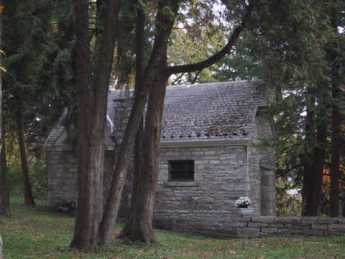
|
| The Columbus Family Chapel |
But off in one corner of the side yard of the mansion is a little stone house, perhaps two stories high. It is a replica of the Columbus family chapel in Spain, copied stone for stone. The stories vary somewhat between guides, but apparently, two or more relatives were descended from Christopher Columbus, and while one Boal was Ambassador to Bolivia, he married a lady in waiting to the Queen who was also descended. Possibly the Spanish Civil War had something to do with it, but in any event, the personal belongings of the Columbus family were judged to be the property of the Boals, so they were moved here to the chapel replica. A decade or so ago, the chapel was broken into by thieves, and since that time security is considerably enhanced. Two pieces of wood are still shown as pieces of the True Cross of Jesus, with authentication going back to the 5th Century, and numerous handwritten journals are there. The Goya paintings and tapestries, and a solid gold crucifix are among the pieces which are now somewhere else. The matter is one of considerable embarrassment. Most of the many pieces which remain, are seeming of the nature of things which would be enormously valuable if you knew what they were, but just about worthless if you don't. In a sense, the best protection is the ignorance which surrounds them. The guide last month remembers one day when 27 visitors came to the Mansion and many days when no one came. As he spoke, you could see at least five hundred cars parked in the Military Museum across the road. There may have been five cars parked in the diamond in the center of Boalsburg. It's sort of a shame that this would be true, just as it makes you grit your teeth to imagine the indifference the whole place would receive if you moved it to Times Square. But, let's face it, the main protection for these invaluable pieces of history lies in that general lack of interest in them.
Third Amendment and Privacy: The Constitution Wanders
 Amendment III No Soldier shall, in time of peace be quartered in any house, without the consent of the Owner, nor in time of war, but in a manner to be prescribed by law. 
|
| The Third Amendment |
The Third Amendment to the Constitution received a few moments of attention during the War of 1812, and the Civil War, but has only been litigated once during a strike of prison guards in New York state. It is, however, the somewhat fanciful basis for the right of privacy, devised for Roe v. Wade, and related this to the controversy over abortion rights.
It would appear that requisitioning the homes of private citizens was largely an expense-saving feature of the peacetime standing armies of European nobility, and thus agitated the opponents of aristocracy and feudalism. Its expense-sparing feature was a source of discontent during the French and Indian War, with its long wilderness border making housing difficult to find. The memories of people living near the frontier were long, however, and Charles Pinckney introduced to the Constitutional Convention one of a great many ill-considered motions which were defeated by that body, opposing the quartering of troops in peacetime. This action was taken up in demagogic style by the Anti-federalist faction, and during the ratification process, quite an issue was made of woeful inadequacy of a Constitution which failed to protect a nation's defenseless households, etc., etc. Matters reached a point where Madison was afraid not to include the matter in the Bill of Rights.
The matter may come up again, however, not merely in abortion controversies, but related to the increasing tendency to wage undeclared wars. Apparently, it was Madison's intent to throw the issue into the Executive Branch in the case of "time of war". No declaration of war was made in the Civil War, or in several other conflicts so that the issue which remains unresolved is what to do about undeclared wars, wars against terrorism, and other conditions which are not exactly either peace or war.
Sixth Amendment
 Amendment VI In all criminal prosecutions, the accused shall enjoy the right to a speedy and public trial, by an impartial jury of the State and district wherein the crime shall have been committed, which district shall have been previously ascertained by law, and to be informed of the nature and cause of the accusation; to be confronted with the witnesses against him; to have compulsory process for obtaining witnesses in his favor, and to have the Assistance of Counsel for his defence. 
|
| The Sixth Amendment |
Ninth Amendment
 Amendment IX Excessive bail shall not be required, nor excessive fines imposed, nor cruel and unusual punishments inflicted. 
|
| The Ninth Amendment |
Fourth Amendment
 Amendment IV The right of the people to be secure in their persons, houses, papers, and effects, against unreasonable searches and seizures, shall not be violated, and no Warrants shall issue, but upon probable cause, supported by Oath or affirmation, and particularly describing the place to be searched, and the persons or things to be seized. 
|
| The Fourth Amendment |
Fifth Amendment
 Amendment V No person shall be held to answer for a capital, or otherwise infamous crime, unless on a presentment or indictment of a Grand Jury, except in cases arising in the land or naval forces, or in the Militia, when in actual service in time of War or public danger; nor shall any person be subject for the same offense to be twice put in jeopardy of life or limb; nor shall be compelled in any criminal case to be a witness against himself, nor be deprived of life, liberty, or property, without due process of law; nor shall private property be taken for public use, without just compensation. 
|
| The Fifth Amendment |
Seventh Amendment
 Amendment VII In all criminal prosecutions, the accused shall enjoy the right to a speedy and public trial, by an impartial jury of the State and district wherein the crime shall have been committed, which district shall have been previously ascertained by law, and to be informed of the nature and cause of the accusation; to be confronted with the witnesses against him; to have compulsory process for obtaining witnesses in his favor, and to have the Assistance of Counsel for his defence. 
|
| The Seventh Amendment |
Eighth Amendment: Bail
 Amendment VIII Excessive bail shall not be required, nor excessive fines imposed, nor cruel and unusual punishments inflicted. 
|
| The Eighth Amendment |
Tenth Amendment: Nothing Up Our Sleeve
The Tenth and Eleventh Amendments are the high-water mark of state power in the American Republic. The main 1787 Constitution lists what the Federal organization might do and might not do, but it only lists a few other things the states may not do. By implication, the states could do everything else. But a great many promises had been made during the ratification campaign, some of them weakened by the atmosphere of salesmanship. The members of the First Congress convened the new government with a long list of hostile, suspicious proposals for amending what many of their constituents regarded as merely honeyed promises. In effect, the anti-federalists were demanding to "have it in writing". Under the circumstances, the most effective promise was one that was simple and short:
 Amendment X The powers not delegated to the United States by the Constitution, nor prohibited by it to the States, are reserved to the States respectively, or to the people 
|
| The Tenth Amendment |
On the Subject of Rights
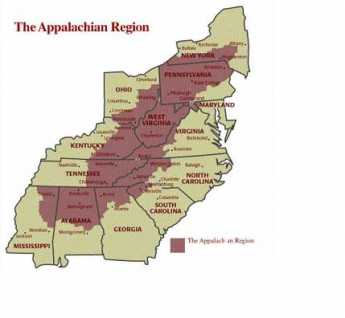
|
| Scotch-Irish Presbyterians of Appalachia |
MOST Americans of the 18th century regarded themselves as members of some minority group. The constitutional Founding Fathers, mindful of Cromwell and the English Civil War, were concerned that majority rule might evolve into tyranny. They searched to protect minorities. Because everyone could imagine being outvoted on some dispute, minority status was a universal American concern about democracy. There was a particularly hot political center of Bill of Rights agitation among Scotch-Irish Presbyterians of Appalachia which persists after two centuries, consequently among Southerners and western Pennsylvanians. In those strongly religious days, it seemed self-evident minorities had "divine" rights, conferred by God, which legislatures must not violate, and legislatures repeatedly seemed to agree. As dissenting minorities later became increasingly secular, the language of rights shifted to "natural" rights, without changing much else. Created by the purely logical analysis of the Enlightenment: a right was something anyone would willingly confer to others in order to preserve it for himself. In more contemporary language, the evolving demand is now for "human" rights, whose mystical authority grows from the intensity with which it is demanded. Although "Vox populi" sounds Roman, the concept of infallibility ("Vox Dei"), is an outgrowth of victory in the American Revolution. Underneath semantic wrestling, one essential is demanded: no government, whether by the king or elected majority, may overrule it. The unthreatened majority easily wearies of such agitation and remains more pragmatically concerned with efficiency, peace, and prosperity. Our two political parties began with Bill of Rights outcry, one party appalled by the French Revolution, the other applauding its feisty spirit.
 A little rebellion now and then is a good thing . . . .It is a medicine necessary for the sound health of government... God forbid we should ever be twenty years without such a rebellion. The people cannot be all, and always, well informed. The part which is wrong will be discontented, in proportion to the importance of the facts they misconceive. If they remain quiet under such misconceptions, it is lethargy, the forerunner of death to the public liberty . . . . and what country can preserve its liberties, if its rulers are not warned, from time to time, that these people preserve the spirit of resistance? Let them take arms. The remedy is to set them right as to the facts, pardon and pacify them. What signify a few lives lost in a century or two? The tree of liberty must be refreshed, from time to time, with the blood of patriots and tyrants. It is its natural manure. 
|
| Thomas Jefferson, 1787 |
The founders of the American republic arrived at a compromise formula: strengthen majority-rule government to a point where it can be effective, but keep government too weak to tyrannize a minority. This Constitutional effort first grew out of a general perception that the Articles of Confederation were too weak to be effective, so the new federal government must be able to control the states in a small number of specified areas. But having achieved that, a reverse concern immediately arose. Since slaves and poor people would probably always outnumber rich ones, how can a democracy be prevented from freeing slaves, or poor people from voting themselves the property of rich ones? This concern was surely heightened by earlier maneuvering by two Virginians. Madison and Washington pressed to have Convention delegates be made up of prominent people, preferably former officers of the Continental Army. Their plan to ensure ratification was for legislatures to make way before a Convention of celebrities. It probably did not occur to the two Virginia plantation owners that this selection process might seem to be purely motivated to ensure the best interests of rich people. Rich people usually have power, regardless of not having a majority. Except for perhaps Gouverneur Morris, Convention delegates, however, were not aristocrats but self-made men, and with few exceptions successful ones. It remains hard to argue with their instinctive reaction that if laws make it impossible for those who have been successful in the past to become a self-made success, then it is impossible to see anyone achieving success. Eighty years subsequently the slave component of this issue was finally settled, but sectional bitterness took its place.
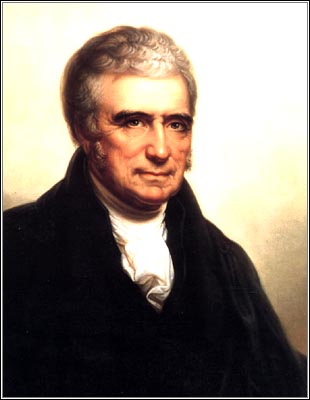
|
| Chief Justice, John Marshall |
The Constitutional Convention weakened the new government to avoid its misuse by a popular majority. They designed separation of its powers, perhaps hoping a balance of power would develop among the Legislative, Executive and Judicial branches, each selected in different ways. As the matter was finally ratified, it seemed a little inadequate. James Madison, in particular, rebelled against the final step of giving the Supreme Court the power to review for constitutionality the laws passed by Congress and signed by the President. It remained for the fourth Chief Justice, John Marshall, to assert judicial review in 1803, sixteen years after the Constitutional Convention. Perhaps with an eye toward symbolism, he did so in a case called Marbury v. Madison.
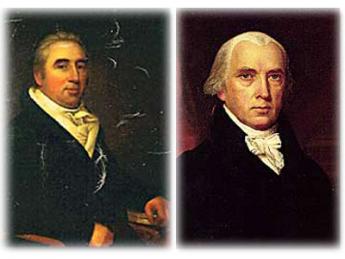
|
| Marbury v. Madison |
This case, strengthened and amplified by later cases with the same outcome, was to enshrine the Constitution as the capstone of the enforcement system of the United States, with all lesser laws consistent with constitutional powers enumerated -- powers implied, and powers are forbidden. This capstone structure, rather than American provincialism so noticed by Europeans, explains why American law has drifted from common law to statutory law, while references in Supreme Court opinions to viewpoints in foreign law are greeted with derision. Foreigners are not given a vote in our system, and our system is grimly determined to recirculate the opinions of its own citizens through the system, especially through the choke-point of the Constitution. In biochemical terms, the Constitution is the rate-limiting factor. It is far too late to try to make it easier to amend the Constitution, just as it is surely too late to eliminate the Electoral College for selecting the President. Too many balance-wheels have been hooked to these fundamentals. Blame it on interest groups if you please, but seriously disturbing these fundamentals will prove unsettling enough to undermine any interest groups that assail them.
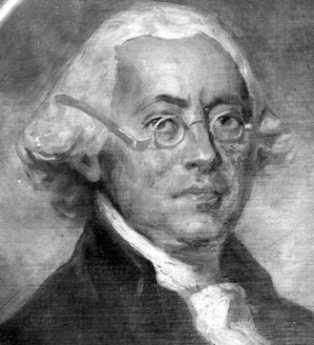
|
| James Wilson of Pennsylvania |
With the blocking of other avenues to constrain majority rule, the system has possibly provided a new one, which may someday be named after James Wilson of Pennsylvania. Wilson lived at the corner of 3rd and Walnut, making it convenient to sign both the Declaration of Independence and the Constitution. Although he spoke 168 times at the Constitutional Convention, his name is most often associated with the idea that basic legal principles should be part of the general background of all educated citizens. Sometimes referred to as the founding professor of the first law school, the University of Pennsylvania, Wilson recognized that the actual practice of the law soon drifts from legal principles to settling on legal mechanics. Law students eventually come to learn that what matters most is what a judge recently handed down as an important opinion setting a new precedent. Step by step the law moves from principles to precedents, and from early precedents to recent precedents. The system is said to be a higher variant on the scientific method -- hypothesis, tests of the hypothesis, modified hypothesis and then tests of the modified version -- first created by Sir Francis Bacon. The law, in short, drifts away from Original Intent but does so proudly, denying a subversion of original principles but asserting a reasoned response to actual experience. Perhaps, in this enlightening process, new human rights can be discovered. Such as a right to abortion based on a right to privacy, based on something else you will have to read the original opinion to recall. It is not necessary to be a fundamentalist Christian to be alarmed by this process when it travels so far from the choke point of the Constitution, overturning dozens of state laws as it goes. Perhaps the most serious criticism of Roe v. Wade is that only two alternatives exist for those who wish to modify it: either undermine the Supreme Court by packing it with supporters of change or else amend the Constitution, which would be nearly impossible to do. Entirely too many plain non-lawyers who have no objection to abortion have read the Constitution and are now mistrustful. Mistrustful of the reasonings of Justice Blackmun, of the profession which acquiesced to his action, and of the intellectual migration process being defended. Whether they know it or not, they are followers of James Wilson, of 3rd and Walnut, Philadelphia.

|
| Jennifer Nedelsky |
Jennifer Nedelsky is a Canadian lawyer who has been active in promoting an alternative to our system of using a constitutional right as a legal "trump card for displeasing laws.", as well as the failed European attempt to invent dozens of new human rights as a way of limiting government power. In Canadian law, a feature is called the "time-limited notwithstanding clause." The legislative branch in Canada is permitted to pass laws which violate a constitutional right, "notwithstanding that right for five years". It is possible to understand the appeal of this legal safety valve, to wait out the popular appeal of a mere fad, or to provide emergency relief in the face of unexpected circumstances. Some of the enduring problems with the legislation passed during the Roosevelt court-packing era might have been more generally acceptable with this clause attached. And it might even address the temptation recently embraced by Rahn Emanuel, that no crisis should ever be wasted. It is true that some appalling legislation does occasionally turn out to be useful. More often, however, it is a well-intended and highly acclaimed law which turns out to create a muddle.
Ultimately, however, we are likely to fall back on the comfort that our Constitution more or less as originally created, has lasted over two hundred years while no other constitution can match that claim. Others have their proposed systems but we have our proven one.
Human Rights

|
| AMA Logo |
ABOUT ten years ago, I first encountered the use of the term "Human Rights". Seated as a member of the House of Delegates of the American Medical Association, I was distracted when a late resolution was passed around for urgent consideration. Such resolutions require a supermajority to be introduced as a business of the House, either two thirds, or three-quarters of the attendees, and a little speech by the author explaining the "reason for lateness". The resolution was a one-line request for endorsement of the concept of Human Rights by the American Medical Association. The stammering explanation for lateness (as distinguished from holding it over to the next meeting) was that it was self-evident that the Association would favor human rights and immediately place it on the "Consent Calendar" for approval without voting on it. Like everyone else in the room, I looked to my seatmate neighbor to ask what this was all about. No one knew, so the author was asked to explain. Well, it was about human rights, not animal rights or corporate rights, and was otherwise so self-evident it needed no further explanation. Just what was in the mind of others seated in that room I cannot say, but to me, the resolution seemed like nonsense, whose author seemed very innocent and naive. In any event, the resolution was dismissed, the paper discarded, and we went on to the medical issues we were there to discuss.
.jpg)
|
| Bill of Rights |
In fact, the whole concept of prosecution for human rights violation is too vague to be useful. When individuals commit outrageous crimes, the matter can normally be handled under the criminal code, with the offense defined and appropriate punishment described in advance. Murder and torture are not commonly affected by whether or not rights have been violated. On the other hand, offenses by component national states are usually regarded as acts of war; if Ghengis Kahn were accidentally admitted to the EU, the punishment would start with expulsion from the Union, and surely go on to war, essentially the same outcome. A nation which was able to deal with the Iroquois and the Comanche tribes surely has no nightmares about Nebraska electing Pol Pot as governor. The human rights advocates have simply got to make a more plausible case for revolutions in our criminal justice system, if they are to be taken seriously.
Constitutional Liberty
WITH British troops in the process of disembarking at New Brunswick, apparently intent on hanging rebels, Robert Morris and John Dickinson annoyed everybody by refusing to sign the Declaration of Independence. Both were fully engaged in the Revolution after the fighting finally got started, and Morris signed up in August 1776. Dickinson had some further reasons of his own, but Morris explained his position quite succinctly. He didn't mind being a British subject, he didn't want a new King, what he wanted was Constitutional Liberty. There is no record of his being directly confronted about this later, and thus no detailed explanation. But whatever did he mean?
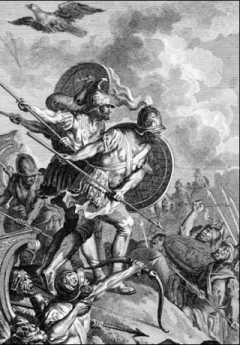
|
| Iliad and the Odyssey |
Morris was of course very bright, even brilliant as a businessman. He had an astonishing memory for detail and was capable of holding his own counsel. He was a person of great daring and prodigious amounts of work. But there is very little evidence that he thought it was useful to be mysterious, or deep. So why not take him at his word, which was essentially that what mattered in a government was whether it kept its promises and allowed its citizens all possible Liberty. It did not matter whether the government had a king, or seldom mattered much who that king was. What mattered was whether it kept its promises, and for that a Constitution is useful. There is no great pleasure in being capricious and arbitrary, so a king who leaves the citizens alone is mostly the best you can ask for. It does, however, help considerably if the rules are fair, clear, and binding. Beyond that, it is unwise to go about toppling governments in the vain hope that a new one is somehow better than the old one. This is putting words into his mouth, to be sure. What he did say was he saw no advantage to getting a new government when what we wanted was Constitutional Liberty. Eleven years later, he was a personal friend of just about everyone with the power to design a new government. Washington lived in his house, or in one next door. Ben Franklin was a business partner. Gouverneur Morris was his lawyer and partner. Just about everybody else who mattered was meeting with him in secrecy for months at a time, in the Pennsylvania Statehouse. And so on.
An essential part of this puzzle of Morris' role could be that the American Constitution was very close to unique in being written out as a document, like a commercial contract. The British Constitution was unwritten at the time and continues to be unwritten today. Many other members of the British Commonwealth operate without a written constitution. And in fact, what passed as constitutions for thousands of years have been unwritten; it was the written American one which was the novelty, not the other way around. It may stretch matters a little to describe the Iliad and the Odyssey as constitutions, but they do in fact describe the system of governance of the Ancient Greeks, clarifying many axioms of their culture for which they were willing to fight and die. We are able to understand the rules for Greeks to live by from reading Homer, almost surely better than we understand the rules of American culture by reading The Federalist Papers. Modern students of geometry, for another example, are taught that all the rules of Euclidian geometry are based on a few axioms stated at its beginning. Change one of those axioms, and you make mathematics unrecognizable. Even Newton's Principia are now seen by mathematicians to be rules which apply only to our universe for certain. There may exist many other universes to which they do not apply. Axioms are themselves mostly regarded as unprovable assumptions. A Constitution, therefore, is regarded in modern times to be much the same thing as a set of mathematical axioms. With one new exception: they are written out on a piece of paper for all to see and agree to -- just like a commercial contract. It would not be surprising to discover that America's great merchant trader, Robert Morris, was horrified at the idea of depending on Vestal Virgins or Judges, or Kings, for their recollection of what the contract says. It, therefore, seems quite natural for a maritime merchant to be agitated by having the rules of British society depend on what King George III chose to emphasize or ignore. Write it down, negotiate it, then tell us what you want so we can agree to it; that's a proper way to define Constitutional Liberty and limit disputes. International maritime trade could not be conducted in any other way, because sea captains who feel abused in a foreign port can abruptly up-anchor and sail away, never to return to that port again until or unless local rules are clarified.
Unless someone discovers some relevant documents in a trunk in the attic, that's about the best conjecture to be made about the American novelty of a written constitution, and its transformative effect on the legal system of all other nations which have one. It would still be nice to know, for certain, whose idea it was.
An Industrial Nation, or a Plantation Society?
There is a phrase much used in diplomacy and politics, sometimes attributed to Lord Palmerston, sometimes to Cicero.
In politics, there are no permanent friends, no permanent enemies, only accommodations.
Regardless of who coined the adage, it is difficult to imagine either stone-faced George Washington listening with any approval, or politician James Madison displaying the least surprise. The only American scholar of politics and political history available to Washington, Madison eventually evolved into a total politician. The evolution in the underlying core beliefs of these two men, in opposite directions, seems to explain the slow transformation of their Virginia plantation friendship into outright hostility. On one level, their disagreements may be seen as responses to their new roles: Washington created and molded the executive department, and while he helped him do it, Madison himself migrated into the role of leader of Congress. Once there, he was not strong enough to escape the collective power of Congress to mold its leaders into servants, a situation that was not corrected until Henry Clay over-corrected it in the opposite direction. On another level, it is possible to view the two Virginians as having different reactions to the oncoming Industrial Revolution.
Although both were Virginia plantation owners, General Washington's wartime experience was that his own solitary opinion, right or wrong, would ultimately be all that mattered. All that advice he got was simply information-gathering. On the other hand, while the leader of the legislative branch was often able to change legislative opinion, he would be ultimately forced to accept the collective opinion of Congress or resign his leadership of it. That was also true of the Chief Executive Officer, but several steps removed from Congressional decisions, and of the opinion, he must finally accept their final wishes if they seemed to represent the will of the people who voted them into office. Of the two, he was better able to understand what Hamilton was talking about, better able to appreciate that the strength of a nation has an economic base as well as a military one. The mythology of the era has Alexander Hamilton in combat with James Madison, with Washington in the middle but eventually siding with Hamilton. That's true enough, but the greater truth is that these individuals were cast as the symbols of the changing beliefs of the country. It must be conjectured the high adventure of creating a new form of government held the three together, even as many things turned out to be unanticipated. Washington seems more dismayed by gradually perceiving some unwelcome imperatives of the Constitution, while Madison simply set about to make the most of them. Washington believed in character, a personality based on steadfastness, courage, and determination. Adaptability, yes, pliability, no.
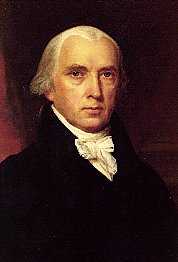
|
| James Madison |
The official organizing principle of every legislature, Congress, or parliament is that each member has one vote and therefore is the equal of every other member. Washington understood leaders would emerge, able to persuade others. What he did not anticipate was that some would scheme to acquire the power to compel obedience. Unofficial ways to acquire power over colleagues differ among legislatures but have certain recurring features.
 Vote-swapping. 
|
The press of business usually requires a division of labor into committees, who soon acquire special expertise. A chairman is selected to handle routine matters, and to negotiate compromises with overlapping committees; the chairman acquires power. Members differ in their degree of interest in almost any topic; those who have little interest in a particular outcome have an opportunity to trade their vote for assistance on some other matter of much greater concern to them; why not? From this evolves the strategy of striving to discover what each voter secretly wants most of all; offering assistance on that favorite topic is the first step in enlisting later support on some other issue. If he wants your help badly enough, he may even vote against something else he really favors. If he wants to be chairman of a committee important to his interest, it may even be possible to force him to vote for something he privately hates. Vote-swapping is the fundamental currency of legislative trading, and it is sometimes a loathsome business. But just try to imagine George Washington swapping votes to become chairman of a committee, or to enact an appropriation; it couldn't happen.
One suspects it did happen, at least once. Washington badly wanted the nation's capital to be across the Potomac River from his plantation. Indeed, he wanted the Potomac River to be the main commercial highway of the nation to the Great Lakes and the Mississippi. He never said he wanted the nation's capital to be named after him, but he did not object a great deal, either. When there was quibbling about the location of the White House, the old surveyor went there himself and laid it out with a surveyor's transit. Washington wanted Virginia to be the biggest most important state in the union; four of the first five presidents were Virginians. And so, when Hamilton and Jefferson negotiated the Compromise of 1790, everyone knew what Washington's feelings were. The revolutionary debts of Virginia became federal debts, in return for relocating the capital from the banks of Delaware to the banks of the Potomac. Robert Morris was fit to be tied. Washington stood aloof and uninvolved. Anyone who has ever been involved in one of these compromises knows that some participants see nothing wrong with it, while others hate themselves forever, for having had anything to do with it. In fact, the legislators most offended by vote-swapping are the ones who once somehow got unwillingly dragged into it, and never entirely forgave themselves. Natural politicians like Madison, however, are irked by those who criticize such a natural and effective process, whose successes are everywhere to be listed. While no one can read the minds of these two founding fathers, there seems little doubt they were on different sides of this enduring division in the personality types of people in public office and therefore headed for a collision whenever a sufficiently major issue arose.
 The genius of the evolving American form of government was to leave land ownership in private hands while creating a new power center in banking and finance. 
|
The issue was major, all right. It was the question of whether this proud new nation was going to join the Industrial Revolution, with all its smoke and crowding, greed and striving. Or whether it was going to sweep majestically along with the romantic movement of the day, the happy farmer and the noble savage, spreading out on a bountiful endless continent. To some extent, this was an echo of the French Revolution which so enthralled Madison's best friend Thomas Jefferson, drawing the conflict between England and France into our own rather recent revolution. Great Britain was a century ahead of France in the Industrial Revolution, which originated north of Manchester where William Penn's Quakers came from. Yes, factories were sort of polluting and crowded, certainly enough to get Marx and Engels excited. But there was another undeniable truth: England soon got richer, acquired a world empire, had a bigger navy, and was soon to beat Napoleon at Waterloo. It was rather easy to prove to George Washington that an economically stronger nation was likely to be militarily stronger as well. Eventually, the point would even be forcibly brought home to Robert E. Lee. American tourists in Europe today echo the sentiment when they chose a vacation itinerary: no churches, and no museums, please. But to be fair to the Virginians, the point was not at all obvious in 1790. Virginia owned what are now three states, and held significant claims to what is now five more. Why would Virginians have any interest in dirty factories or the grubby strivings of immigrant merchants?
Still another historical curiosity emerges from the twenty-five years of Philadelphia as the new nation's capital, which is really our national epic poem, waiting for its Homer to compose it. Just about everybody at the Convention agreed the national government had to be strengthened; the state legislatures were going to ruin us. Madison, representing the views of the landowner aristocracy, was also afraid the national government could get too strong and ruin them by disturbing private property ownership. Hamilton didn't care about the land, he cared about money; he wouldn't mind a King if one was necessary to get things done. It should be remembered that feudalism was largely based on the king's right to reassign land ownership in return for military support. The genius of the evolving American form of government was to leave land ownership in private hands while creating a new power center in banking and finance. So it eventually evolved that Madison and his friends from Appalachia wanted to limit the powers of the national government strictly to those few areas where we needed it strong; enumerated powers were the result. The Federalists following Hamilton stretched enumerated power as far as it would reach with extra "implied" powers, together with their "emanations and penumbras". If you were to defend the nation, you needed a navy; eventually, it would be implied you needed an air force, maybe atom bombs. Increasing Federalism was the driving force of the Republican Party down to the time of Franklin Roosevelt, indeed down to the moment when the Philadelphian Owen Roberts tipped the Supreme Court majority in favor of eliminating "the commerce clause". Since that time, the Republican descendants of Alexander Hamilton have sought to shrink and restrain federal powers and bureaucracy, while the political descendants of James Madison have sought to populate Virginia with civil servants up to and beyond Piedmont. Both Madison and Hamilton must be turning in the grave about the way this topic evolved. But the power being struggled for is all commercial power; ownership control of land remains off the political table. Perhaps the day will come when fresh land no longer seems unlimited, making monopoly control of it seem more threatening. More likely, the agricultural economy will nearly vanish, taking its power struggles along with it. The paradox emerges that increased productivity will likely shrivel the importance of manufacturing as well, leaving both farm and factory as relics of the past. The test of a constitution is how well it adapts to an unknown future.
Terrorists: Mafiosa or Just Nuts?
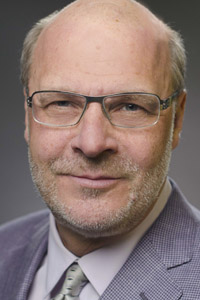
|
| Dr. Eric A. Zillmer |
At a recent meeting of the Right Angle Club, meeting in the Pyramid Club quarters nowadays, a psychology professor from Drexel gave a talk on the psychology of terrorists. He looks as though he played basketball himself, and rather favored the espionage approach to the law enforcement one. Together with the trouble exactly clarifying his role either with Drexel or the government, it all suggested the Yale approach rather than the Notre Dame one if you understand what I mean. He gave an excellent talk, and questions would have gone on for hours if he had been able to stay longer.

|
| al-Qaeda or ISIS |
One interesting distinction he makes is between organized crime and mental illness. That is, between al-Qaeda or ISIS, and solitary Americans who shoot random schoolchildren in high school cafeterias. Both nationalities tend to end up dead at the end of the episodes, because the swat teams called in, have little patience (or trust) with risking lives to read Miranda Rights to people with smoking machine guns in their hands. But either because there are actually some survivors, or because other members of the criminal network are caught and interrogated, several hundred terrorists have ended up in Guantanamo for further interviews. Somehow, or for some reason, it was arranged for our speaker to interview them on cellphones, with a military interpreter on the line.

|
| Suicide Bombers |
Now that the Middle Eastern uprising has gone on for a few years, he said is possible to distinguish two different types of Muslim terrorists, the ones who get blown up in the attack, and others, their handlers whom they have often never met before. These handlers are to pull the triggers on radio devices to set off the suicide vests worn by the "useful idiots", who are sometimes hesitating at the last moment. The ones who get blown up are usually educated young male idealists from the upper classes, quite sane and highly dedicated to the cause they serve. They and their families will be glamorized later for their sacrifice, whereas the gimlet-eyed handlers fade off into the distance through the networks of safe houses. When they do get caught by intelligence agents of various sorts, they generally prove to fit the mold of tough-minded mafiosa, in this tough business for long-run power and control. They might be conspirators, but could hardly be called idealists.

|
| Peaceful Domestic |
At least, that's what our Drexel professor said he believed to be the case, and in general, his prescription for winning this war is to enlist the support of the wavering majority of Muslims who belong to neither one of the activist groups -- yet. Meanwhile, peaceful domestic American citizens can play an important role in distinguishing warrior enemies of several sorts from the occasional young American schizophrenics in cafeterias acting as lone wolves with their mayhem. The American variety needs electroshock therapy more than they need more rights, defense lawyers or longer prison terms. Strengthening or weakening the Second Amendment will have little effect on any of these people, Asian or American, but it might hamper the national survival to mischaracterize the two groups once they are taken into custody. Essentially, the intelligence community doesn't care what is done with the nutcases, as long as you don't hamper their efforts with the Mafiosa. And judging from the Human Rights protectors, they don't much care what happens to the Mafiosa, so long as we protect the rights of nutcases. There are surely a few double-agents mixed in, whose motives for saying what they say, are kept unclear. When the shouting dies down there are nevertheless elements of hope in this controversy. But it could easily get out of control. Because we are outnumbered worldwide, we might just lose.
Abortion
The official position of the Pennsylvania Medical Society on the topic of abortion is, we have no position on abortion. I ought to know because I was the author of this position, proposed at a moment when the PA Medical House of Delegates was obviously going nowhere. After two hours of angry debate, we had to stop before we split into two warring medical societies. The Pennsylvania delegation to the AMA was then obliged to hold the same no-position on a national level. As I recall, our position was likewise greeted by the AMA House of Delegates with great relief, and word quickly circulated in the corridors that Pennsylvania had a position everyone could endorse for the good of the organization. For several years, this no-position position was widely referred to whenever the topic threatened to arise. It almost invariably stopped the discussion in its tracks, as it was intended to do. In going back over the minutes, it would appear the AMA never actually voted to adopt a no-position motion, a discovery that surprised but did not change the basic determination to let the rest of the nation settle this. We were going to stay out of it.
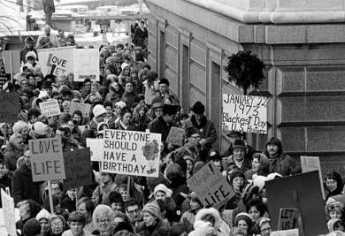
|
| Roe vs. Wade |
Because, one hundred forty years earlier, we started it. If you actually read Justice Blackmun's opinion for the majority in Roe v. Wade, as very few agitated proponents seem to have done, the original medical origin is clearly laid out. Blackmun had been a lawyer for the Mayo Clinic before his appointment to the Supreme Court, acquiring unusual medical resources and experiences for a lawyer. Now prepare for a logical leap, to the The Gross Clinic, Thomas Eakins masterpiece painting of Philadelphia's pre-eminent surgeon in a black frock coat, holding a dripping crimson scalpel in his bare hand, encapsulates the original situation. Note carefully that anesthesia is being given to the patient, but the surgeon is not wearing a cap, mask, gown, or rubber gloves.
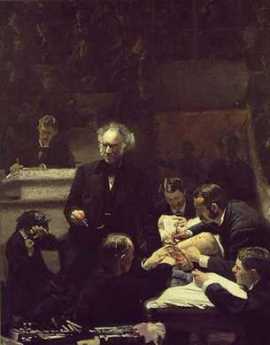
|
| Gross Clinic |
In 1850 medical science had progressed into a forty-year time window when anesthesia made abortions painless, but Pasteur had still not identified bacteria, and Lister had not devised a way to cope with them. Abortions, common in ancient Greece but forbidden by Hippocrates, suddenly were widely demanded by 19th Century women in a situation when their judgment was vulnerable. Abortions were easy to do, all right, but women died like flies from the resulting infections, and the American Medical Association was distraught about it. The Oath of Hippocrates was brought forward to emphasize its prohibition of abortion, and the performance was made unethical for a member of the Association, sufficient cause to warrant expulsion. When that proved inadequate, the delegates agreed to go to their local state legislatures and seek legislation prohibiting the performance of abortion by anyone, member or non-member of the Association. These laws were quickly passed, and it was the Texas version which was overturned by Roe v. Wade as an unconstitutional denial of privacy. Roe was a pseudonym for the patient, and Wade was then Attorney General of Texas, the officer charged with enforcing Texas law. By 1900 abortions became both easy and safe for the mother, and by 1911 the AMA had reversed its position. The scientific surgical situation is well illustrated by a later famous painting about Philadelphia surgery by Thomas Eakins, the Agnew Clinic, in which the surgical team is portrayed in its modern costume of sterile gowns and rubber gloves. But it didn't matter since by that time various churches had hardened their doctrines. Religious leaders and their constituent politicians simply no longer cared what the medical profession thought about it. For at least the following century, ideological combatants were plainly only interested in whether physician opinion might advance one side or the other of their argument with useful official statements. Our real position, if anyone cares, is that we started out seeking protection for the safety of the mother, but the issue got twisted by others into disputes about the welfare of the unborn fetus.
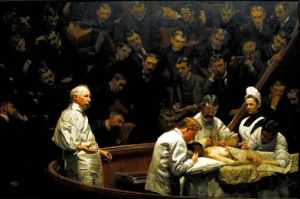
|
| Agnew Clinic |
Since this is the case, there plainly may be a reason for state legislatures to reconsider the state laws they passed in the 19th Century, during that forty-year window of time when the scientific facts were in transition. But when a leap is made by the appointed referees of the federal government to overturn state laws, even about a basically medical issue, there has to be some legal reason to intervene; a medical reason somehow doesn't count. Justice Blackmun's discovery of an unnoticed right to "privacy" in the Constitution, where the word does not appear, is just too hard for us non-lawyers to deal with. Suppose we leave the fine points of the Bill of Rights to those constitutional lawyers. What's at stake here, among other things, of course, is whether the Federal Courts are justified in overturning well-intentioned state laws which had served well for at least fifty years -- simply out of impatience with the sluggishness and political timidness of state legislatures to revise obsolete laws. That's unbalancing the Constitution for a comparatively minor cause. Even major cause is something we have agreed to adjust in other ways, by amendment, not judicial opinion. And that's my opinion, having comparatively little to do with abortion.
Seventeenth Amendment

|
| Seventeenth Amendment |
The Seventeenth Amendment of the Constitution provides for the direct election of U.S. Senators; prior to that, the states could decide for themselves how to select their Senators. The Amendment was proposed in 1912 and ratified in 1913. Today, most people have no opinion whether the Amendment was good or bad, necessary or unnecessary. The Progressives of 1912 professed to be shocked, shocked, that wheeling and dealing went on in the state legislatures every time there was a vacancy in the Senate. Indeed, few contestants on TV quiz shows would be able to tell you what the Amendment was about. It would be hard to find a person who would, without further study, be opposed to a reaffirmation of "The Senate of the United States" shall be composed of two Senators from each State, elected by the people thereof, for six years; and such Senators shall have one vote. The electors in each State shall have the qualifications requisite for electors of the most numerous branch of the State legislatures."
If you search for reasons -- why in the world would there be a fuss about this topic, 125 years after the "Constitutional Convention -- several plausible reasons are stated, all of them amounting to legislature incompetence. Such as deadlocks resulting in vacancies remaining unfilled, influence by corrupt political organizations and special interests through the purchase of legislature seats, and neglect of duties by legislators because of politics. Even though news of these matters has failed to persist in the national recollection, they seem plausible enough; it sounds like local politics, all right. But the plausibility was there in 1787, too, and surely the founding fathers expected something like that when they let the States select their Senators as they pleased. The whole idea surely was to give the states additional reassurance that they could block any further transfer of state power to the federal government; direct election of senators clearly reduced the power of state governments in the federal/state struggle. Mostly, of course, by the State Legislators selecting one of their own members to go to Washington.
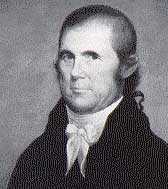
|
| John Marshall |
We have here a tilting of our governance from a Republic toward a Democracy, following the philosophy of John Marshall, of all people, that the behavior of all State legislatures everywhere will inevitably lead to mischief. Just a minute, please, let's give this a little thought. Surely the vast amounts of campaign money required to run for a Senate seat compare with the amount a special interest would have to spend to buy a majority in the Legislature of a State. As a practical matter, most special interests have lost interest in State politics and spend their money in Washington -- except for those few special interests that are exclusively State regulated. This comes down to the insurance and real estate industries, with insurance only there because of the McCarran Ferguson Act. This isn't only because of the Seventeenth Amendment, it also has to do with Franklin Roosevelt's Court-packing attempt, which is discussed elsewhere.
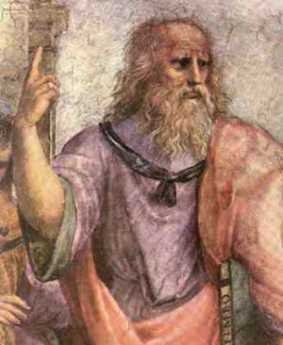
|
| " Plato" using Leonardo da Vinci as model. |
The idea of a Republic, originally set down by the Greek philosopher Plato, was that a small group of elite philosophers (you will have to forgive his professional biases) who meet together occasionally, would be better able to pick a member of their group for higher responsibilities, than would the populace. The inner circle would know who was an alcoholic, a phony, a pervert, a coward or a loafer, whereas these qualities can be concealed from mass audiences long enough to get elected. Such an in-group in a legislature may pick a bad person, or deliberately reject a good one, but they do it on purpose, not because they are fooled. The issue of direct election of Senators comes down to whether you think it is more likely that a legislature will be corrupt, or the voting population will be ignorant. Hard choice.
Meanwhile, election to the State legislature has been reduced to an inconsequential backwater, almost guaranteed to have an adverse effect on the members. There was a time when people who wanted to be U.S. Senator knew they must first run for the Legislature, where their skills could be tested and perfected. National affairs became State affairs, with legislators well aware that they could unseat a Senator whose national behavior displeased them. There are many States, Pennsylvania among them, who collectively pay far more federal taxes than they receive in federal benefits. Call it pork barrel if you like, the present degree of interstate wealth redistribution could not possibly continue at present levels if we repealed the XVII Amendment.
Eleventh Amendment
There are certainly a lot of Ingersolls in Philadelphia. A lot of Jared Ingersolls, a lot of Charles Ingersolls, and even a lot of Charles Jared Ingersolls. At a dinner party, a lady whose maiden name is Ingersoll was asked about Charles Ingersoll, and was forced to say, "Just how old would you say he is?"
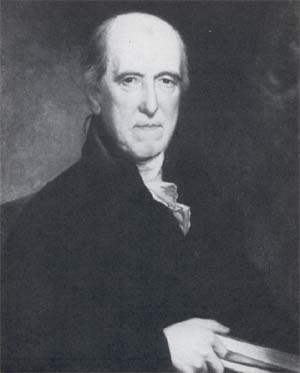
|
| Jared Ingersoll, Jr., |
The one we are talking about here is Jared Ingersoll, Jr., the son of a Tory who had once been tarred and feathered by Revolutionaries in New Haven. Young Jared was in England at the Inns of Court when the Declaration was signed, became a fervent Revolutionary, and represented Pennsylvania at the Constitutional Convention. It was thus difficult to predict where his sympathies would lie in the settling of debts and grievances associated with the Revolutionary War; in fact, he might be as impartial as any lawyer to be found at the time. At their best, all lawyers reach for the peaceful settlement of grievances, serving their clients best by finding a solution that puts an end to reprisals. Furthermore, he had excellent legal training, something which could not be said of most apprentice-trained lawyers of that time, and had faithfully attended every single session of the Continental Congress, while commenting very little about his own views. The first ten amendments are the Bill of Rights which had been promised during the ratification process, so the Eleventh became the first real amendment, in the sense that it specifically reverses some feature of the original design. To present observers it may not be easy to surmise just what the purpose might have been to outlaw the method which had been established for an injured citizen to sue a state. To be blunt about this point, the colonists wanted to welch on paying debts to Loyalists and Englishmen, those hated enemies, without admitting this was their motive. The spin they put on this shabby attitude was that states were now sovereign entities without a king, and since historically a British king could not be sued without his consent, therefore neither could the states. Probably the best that can be said for this cloud of words is the point that suing the government should not be made too easy, for fear of overwhelming the court system with endless clamor. The historical episode surrounding the Eleventh Amendment is an important one in our national struggle to balance the accusations of hypocrisy and chiseling, with the opposite tendency of slavish adherence to procedure, or "due process".
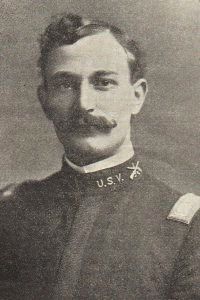
|
| Alexander Chisholm |
Ingersoll had attended the Constitutional Convention as part of the most influential state delegation of insiders and was set up to practice law in the capital city of Philadelphia just a few blocks from the heart of government. A case came up. The estate of Captain Robert Farquhar, an Englishman, was owed $169,613.33 for "goods" sold in 1777 to agents of the embattled State of Georgia during the Revolution. The executor of Farquhar's estate, a resident of South Carolina named Alexander Chisholm, then sued the state of Georgia after the war was over for that state's extinguishing the debt by a statute passed after the contract. This had been the rather common treatment of Loyalist debts by other colonies and thus enlisted their sympathies to Georgia in this case. Furthermore, it was the sort of uncivil behavior that had enraged John Jay and George Washington, leading them to press for the Constitutional Convention. On the other hand, the new state governments were hard-pressed for cash and had to contend with highly combative citizens who resented even the suggestion that they play fair with people who had so recently been trying to kill them. Furthermore, it was entirely realistic for them to fear a flood of lawsuits from people they mercilessly pursued under what "everyone" considered the rebellion's accepted rules of engagement. It was thus clever for Georgia to seek the help of Ingersoll in appealing to the Supreme Court, and the previous tarring and feathering of his Loyalist father was not entirely irrelevant. Ingersoll, unfortunately, lost his case of Chisholm v Georgia when the Supreme Court (John Jay, CJ) declared that Chisholm was indeed entitled to sue the State of Georgia. It is hard to see how Ingersoll (and his colleague Alexander Dallas) could have won this case when the Constitution which he helped write plainly provided the rules for citizens of one state suing another state; it seems remotely possible that the officials of Georgia were attempting to shift the blame of an inevitable loss of the suit:
Article III - Section 2 -The judicial Power shall extend to all Cases, in Law and Equity, arising under this Constitution, the Laws of the United States, and Treaties made, or which shall be made, under their Authority; to all Cases affecting Ambassadors, other public Ministers and Consuls; to all Cases of admiralty and maritime Jurisdiction; to Controversies to which the United States shall be a Party; to Controversies between two or more States; between a State and Citizens of another State; between Citizens of different States; between Citizens of the same State claiming Lands under Grants of different States, and between a State, or the Citizens thereof, and foreign States, Citizens or Subjects.
John Jay ultimately revealed the depth of his dismay at dishonoring debts when he negotiated Jay's Treaty during the Adams administration, providing for adjustment of such debts. Adams, in turn, was to reveal where his own sympathies lay by refusing to announce -- for three years -- the reversal of this position by the Eleventh Amendment, stirred up in his own state. Adams' rather flagrant abuse of a technicality might well have led to another constitutional amendment, except for the Supreme Court later ruling that official enactment of amendments did not require Presidential announcement, but took effect upon ratification by the required number of states.
Adams, in turn, had ample political problems in his home state of Massachusetts. John Hancock, then Governor, called a special session of the Massachusetts legislature to propose an amendment to reverse the Constitutional language on which the Supreme Court's decision had relied: It soon became clear, or perhaps Ingersoll was determined to make it seem clear, that Georgia had been smart to employ this political insider. Congress soon enacted, and the necessary states soon ratified the Eleventh Amendment. It stated that a citizen of another state may not sue a State government in Federal Court:
Amendment XI. The Judicial power of the United States shall not be construed to extend to any suit in law or equity, commenced or prosecuted against one of the United States by Citizens of another State, or by Citizens or Subjects of any Foreign State.
Later decisions included citizens of the same state, so in effect, this amendment stated that no one may sue a State Government unless the state agrees to be sued. That's essentially what is true of the federal government; the states were given the same sovereignty with all of its features, as the federal government and that was an intentional slap in the Federalist faces.
It sounds as though Jared Ingersoll might have been a states-righter, although nothing in his past or future behavior suggests that he was anything but an ardent Federalist. He was even proposed as vice presidential candidate for the Federalist Party. No one called him wishy-washy, or a traitor or a covert anti-federalist, and he never acted like one. He was just a lawyer with a client.
| Posted by: Rebekka | Apr 23, 2012 9:37 PM |
27 Blogs
C10.....Ratification
 New blog 2013-02-04 18:47:48 description
New blog 2013-02-04 18:47:48 description
Concessions and Agreements
 Most 17th Century colonies were proprietorships, requiring agreements for local autonomy without losing allegiance to the home country. William Penn cleverly expanded the New Jersey document into the intellectual precursor of the U.S. Constitution.
Most 17th Century colonies were proprietorships, requiring agreements for local autonomy without losing allegiance to the home country. William Penn cleverly expanded the New Jersey document into the intellectual precursor of the U.S. Constitution.
Declaration of Rights of the Continental Congress, October 14, 1774
 .
.
Sources of Revolutionary Populism
 A major source of growing populism among the aristocratic founding fathers was the aging of rebel boys into Revolutionary Veterans.
A major source of growing populism among the aristocratic founding fathers was the aging of rebel boys into Revolutionary Veterans.
Appealing the Constitution to a Higher Authority
 The original intent of the Constitution has as much to do with what the audience thought they heard, as what the Founders meant they were saying. Or possibly, what Gouverneur Morris thought they were saying.
The original intent of the Constitution has as much to do with what the audience thought they heard, as what the Founders meant they were saying. Or possibly, what Gouverneur Morris thought they were saying.
Repairing Constitutional Defects
 The concept of an amendable constitution was first devised by William Penn and utilized in his form of government of Pennsylvania. But Federalists at the 1787 Constitutional convention feared amendments would weaken the document's power. The alternative, repeat Conventions in which everything would again be on the table, ultimately seemed even more destabilizing. Amendments are permitted, but discouraged by difficult methodology.
The concept of an amendable constitution was first devised by William Penn and utilized in his form of government of Pennsylvania. But Federalists at the 1787 Constitutional convention feared amendments would weaken the document's power. The alternative, repeat Conventions in which everything would again be on the table, ultimately seemed even more destabilizing. Amendments are permitted, but discouraged by difficult methodology.
James Madison
 New blog 2012-07-03 15:44:59 description
New blog 2012-07-03 15:44:59 description
First Amendment: Separation of Church and State
 Eleven of the original thirteen colonies had,"established" religions. The separation of church and state by the First Amendment was not a statement of fact, but a worrisome departure from the past, mostly prompted by the behavior of the Virginia Episcopalians. For the Pennsylvania Quakers, disestablishment was a most disheartening event.
Eleven of the original thirteen colonies had,"established" religions. The separation of church and state by the First Amendment was not a statement of fact, but a worrisome departure from the past, mostly prompted by the behavior of the Virginia Episcopalians. For the Pennsylvania Quakers, disestablishment was a most disheartening event.
Boston firearms license
The process is reputed to be onerous. Here's what my son went through.
Second Amendment: The 28th Infantry Division
 Seldom regarded as a warlike state, Pennsylvania has one of only eight reserve divisions of the U.S. Army and the oldest.
Seldom regarded as a warlike state, Pennsylvania has one of only eight reserve divisions of the U.S. Army and the oldest.
Boalsburg
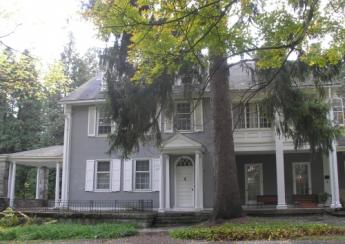 Eight generations of the Boal family have lived in the house in Boalsburg, where you can see five signatures of Presidents of the United States, and the personal possessions of -- you heard me -- Christopher Columbus.
Eight generations of the Boal family have lived in the house in Boalsburg, where you can see five signatures of Presidents of the United States, and the personal possessions of -- you heard me -- Christopher Columbus.
Third Amendment and Privacy: The Constitution Wanders
New blog 2012-07-31 14:59:08 description
Sixth Amendment
New blog 2012-07-31 16:33:33 description
In all criminal prosecutions, the accused shall enjoy the right to a speedy and public trial, by an impartial jury of the State and district wherein the crime shall have been committed, which district shall have been previously ascertained by law, and to be informed of the nature and cause of the accusation; to be confronted with the witnesses against him; to have compulsory process for obtaining witnesses in his favor, and to have the Assistance of Counsel for his defence.[1]
Ninth Amendment
New blog 2012-07-31 16:36:39 description
The amendment as proposed by Congress in 1789 and later ratified as the Ninth Amendment reads as follows:
The enumeration in the Constitution, of certain rights, shall not be construed to deny or disparage others retained by the people.[1]
Fourth Amendment
New blog 2012-07-31 16:31:15 description
The right of the people to be secure in their persons, houses, papers, and effects,[a] against unreasonable searches and seizures, shall not be violated, and no Warrants shall issue, but upon probable cause, supported by Oath or affirmation, and particularly describing the place to be searched, and the persons or things to be seized.[2]
Fifth Amendment
New blog 2012-07-31 16:32:42 description
The amendment as proposed by Congress in 1789 reads as follows:
No person shall be held to answer for a capital, or otherwise infamous crime, unless on a presentment or indictment of a Grand Jury, except in cases arising in the land or naval forces, or in the Militia, when in actual service in time of War or public danger; nor shall any person be subject for the same offence to be twice put in jeopardy of life or limb; nor shall be compelled in any criminal case to be a witness against himself, nor be deprived of life, liberty, or property, without due process of law; nor shall private property be taken for public use, without just compensation.
Seventh Amendment
The amendment as proposed by Congress in 1789 reads as follows:
In Suits at common law, where the value in controversy shall exceed twenty dollars, the right of trial by jury shall be preserved, and no fact tried by a jury, shall be otherwise re-examined in any Court of the United States, than according to the rules of the common law.
The Bill of Rights in the National Archives
Eighth Amendment: Bail
New blog 2012-07-31 16:35:48 description
Tenth Amendment: Nothing Up Our Sleeve
Short and sweet, the Tenth Amendment makes it explicit that the several American states gave nothing to the Federal government unless the Constitution spelled it out.
On the Subject of Rights
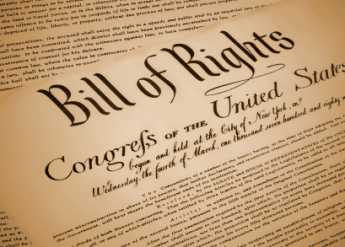 Human rights were mainly a religious issue to the Founding Fathers, demanding a Bill of Rights to signify God's supremacy over legislatures. When John Marshall transformed the Constitution into the capstone of the legal system, constitutionally affirmed rights became a legal trump card for those who feared or opposed the actions of the government. With that difference, it's little different, two hundred years later.
Human rights were mainly a religious issue to the Founding Fathers, demanding a Bill of Rights to signify God's supremacy over legislatures. When John Marshall transformed the Constitution into the capstone of the legal system, constitutionally affirmed rights became a legal trump card for those who feared or opposed the actions of the government. With that difference, it's little different, two hundred years later.
Human Rights
 Human Rights is a popular term, but not a very clear one.
Human Rights is a popular term, but not a very clear one.
Constitutional Liberty
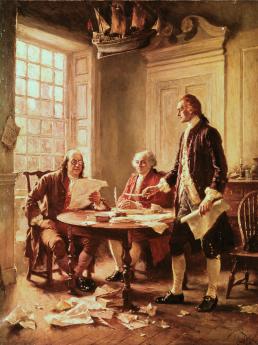 Robert Morris refused to sign the Declaration of Independence because what he really wanted was Constitutional Liberty. He didn't even mind being a British subject and didn't want a different King. What was this all about?
Robert Morris refused to sign the Declaration of Independence because what he really wanted was Constitutional Liberty. He didn't even mind being a British subject and didn't want a different King. What was this all about?
An Industrial Nation, or a Plantation Society?
 The founding of America produced patriots, heroes, revolutionaries and other idealists. James Madison was our first modern politician.
The founding of America produced patriots, heroes, revolutionaries and other idealists. James Madison was our first modern politician.
Terrorists: Mafiosa or Just Nuts?

Abortion
 As I recall, our position was likewise greeted by the AMA House of Delegates with great relief, and word quickly circulated in the corridors that Pennsylvania had a position everyone could endorse for the good of the organization.
As I recall, our position was likewise greeted by the AMA House of Delegates with great relief, and word quickly circulated in the corridors that Pennsylvania had a position everyone could endorse for the good of the organization.
Seventeenth Amendment
 The consequences of this little-noticed amendment should be re-examined.
The consequences of this little-noticed amendment should be re-examined.
Eleventh Amendment
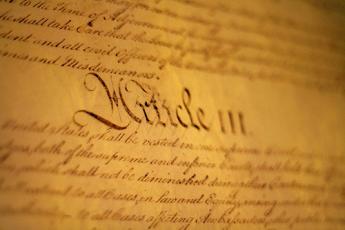 Since the Bill of Rights doesn't really count as corrections, the Eleventh Amendment is sort of the first attempt to change the Constitution. In retrospect, the purpose seems unclear.
Since the Bill of Rights doesn't really count as corrections, the Eleventh Amendment is sort of the first attempt to change the Constitution. In retrospect, the purpose seems unclear.